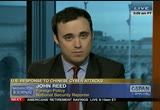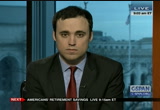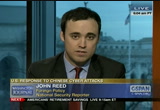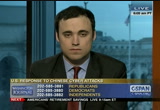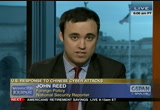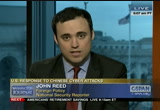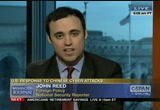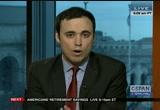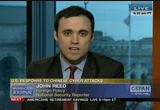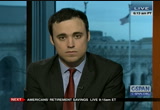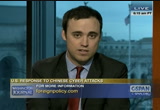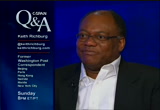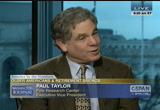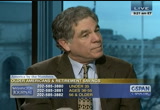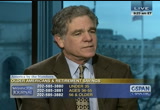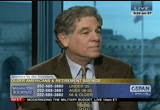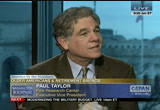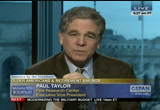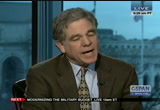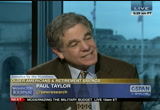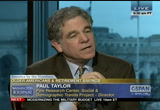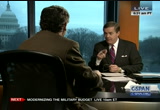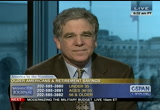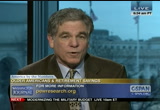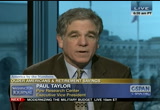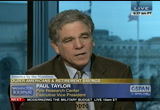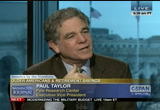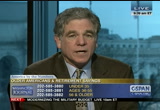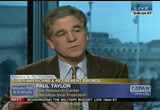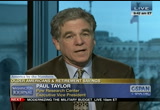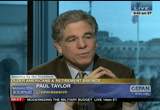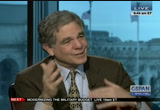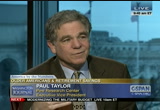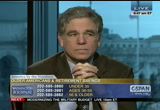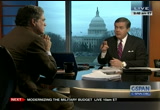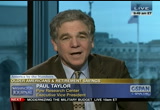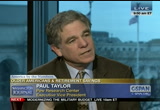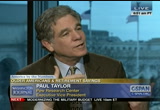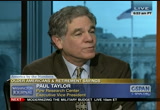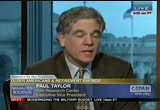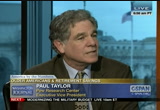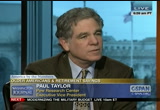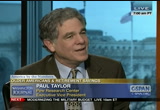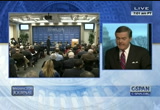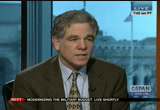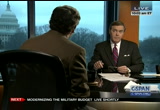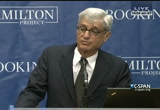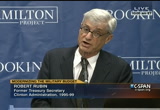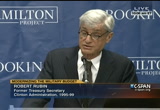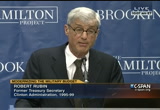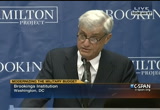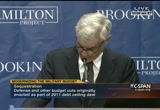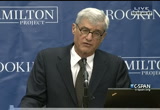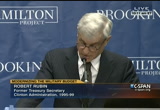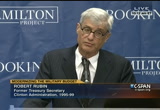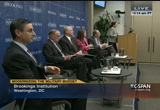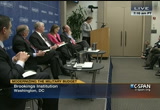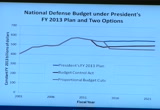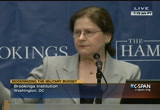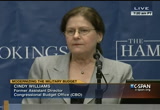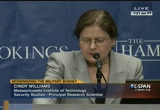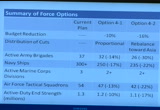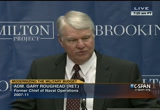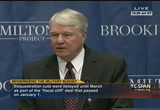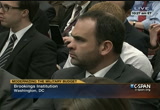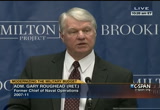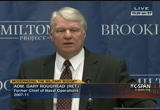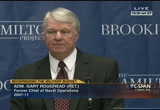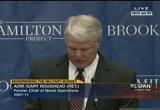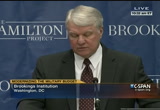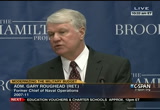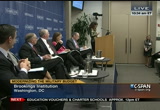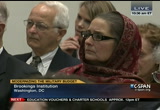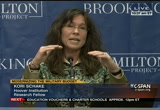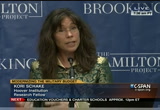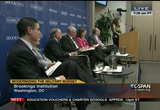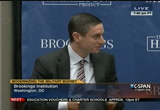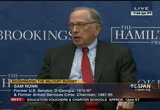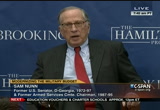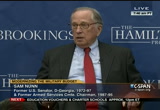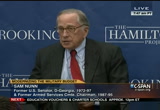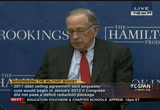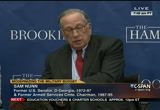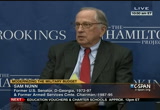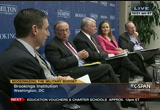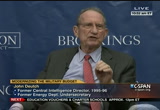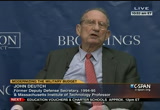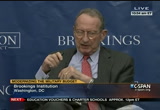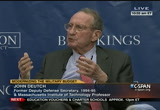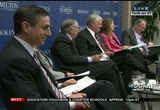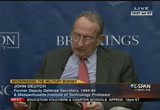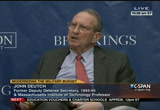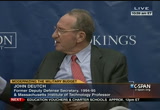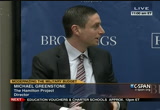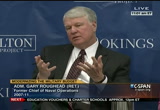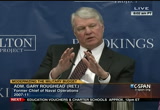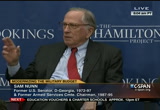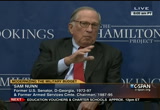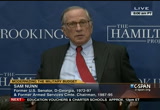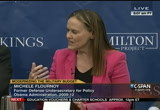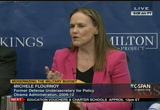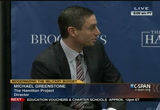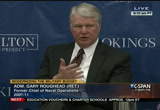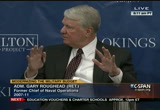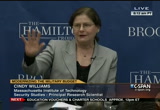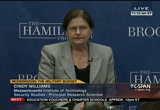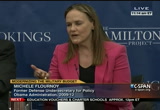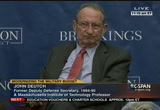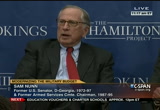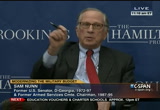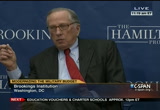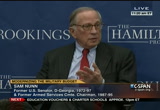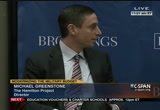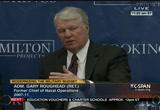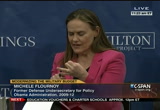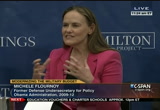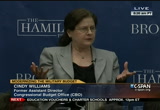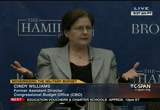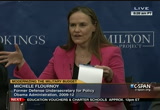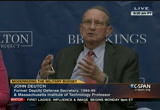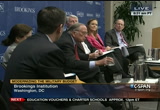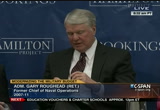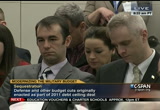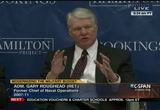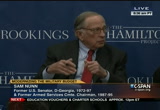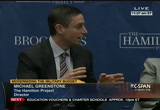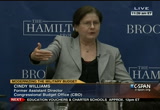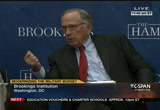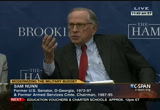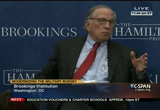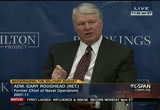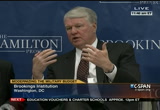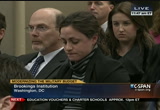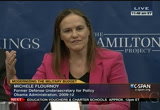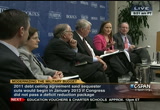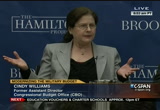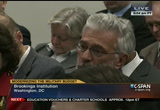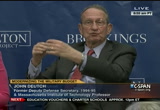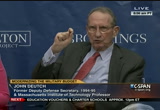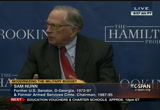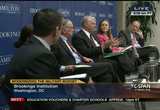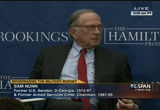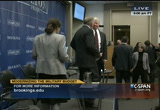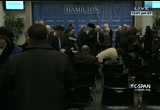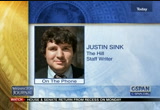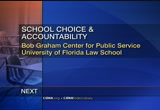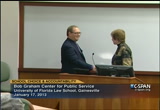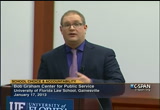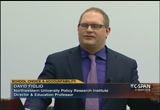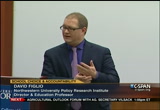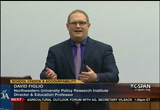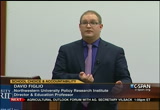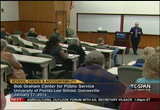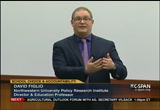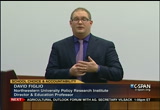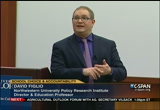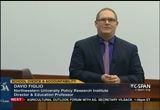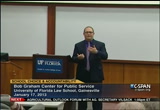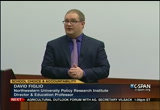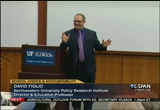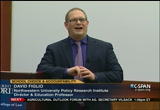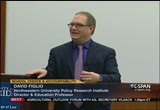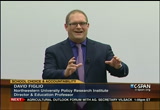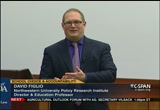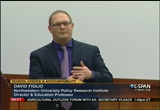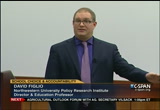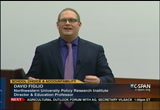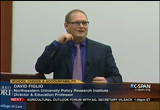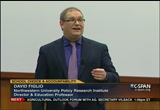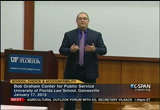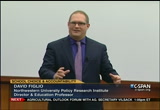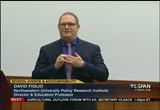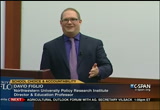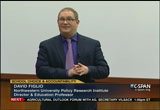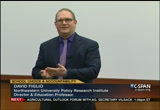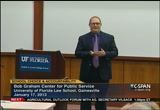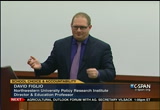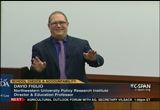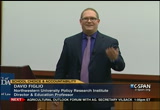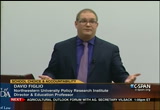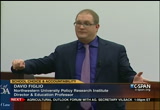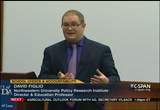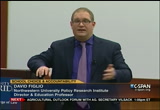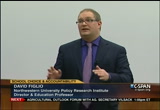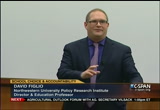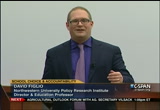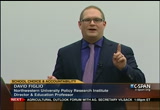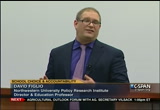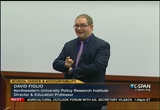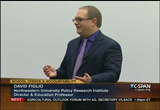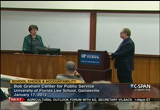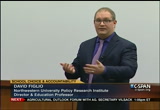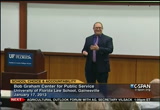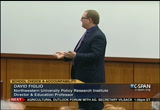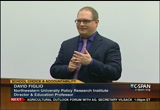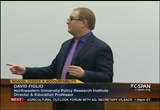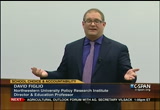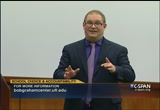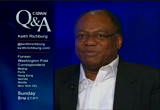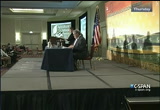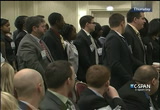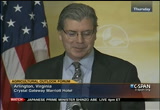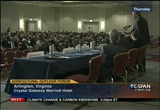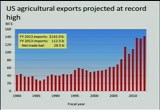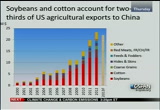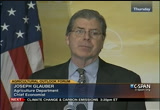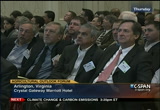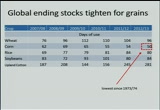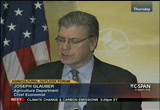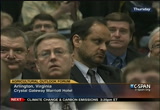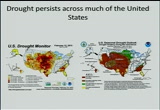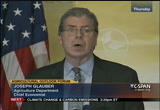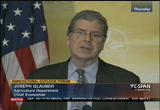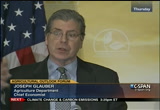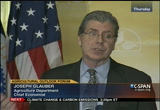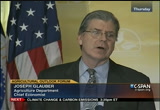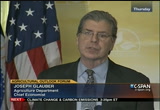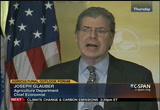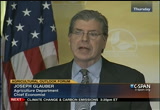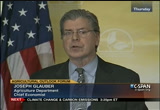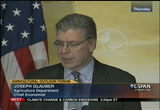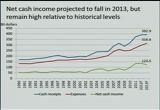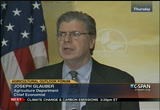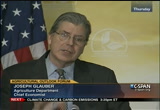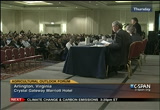tv Public Affairs CSPAN February 22, 2013 9:00am-2:00pm EST
9:00 am
war against the united states. the chinese hackers are catching up. they have made enormous strides in the last 10 years. >> there talking about u.s. response to a potential cyber attacks from china. earl is on the phone from maryland, independent line. >> i think this problem is not going to be resolved for the simple reason -- i used to tell my children that what you accept is what you teach. americans do the same thing to iran and now want to say the reason why they do it is because of good reasons while others do it for bad reasons. good and bad is relative.
9:01 am
because they do it for different reasons other than you, you never look at the principle of what you are doing. a lie is a lie in a matter what good reason you tell a lie for. they learn have to be deceitful like you. guest: the u.s. government is allegedly behind the seven attack in iran that destroyed several thousand nuclear centrifuges a year -- centrifuges a couple years ago. we spy on other governments. we spy on other countries create but we are not using the nsa to spy on chinese businesses. other countries are going to look at our astronauts.
9:02 am
-- at our espionage. >> from twitter -- and this op-ed from the commentary section. a smack down on china's side for thieves. he also points out that this is not the first time that china has been caught doing this, going back to early in the last decade. an investigation revealed that -- guest: that is what we were talking about. if you have been paying attention dissever security, you have been watching this go on for the last decade or more.
9:03 am
companies that were working on the f35 program, and then last fall we saw something produced in china that looked an awful lot like an f35. you cannot directly to be that to the hacking of the program. it just looks like it. host: richard is on the phone from florida. good morning. caller: i agree with some of your callers. we have been doing -- a number of years ago china forced down a spy plane. you have mentioned cyber attacks against iran. i do not know how much we were involved in having scientists killed.
9:04 am
we seem to run drones into other people's countries without any problem in killing people. how would we feel if somebody threw a drone in our country and assassinated somebody. guest: that is the argument. i just sat down with a famous russian cyber security expert. he is talking about how easy it would be to reverse engineer a virus. it is what people claimed the united states used against iran. they could use against us on our power facilities. people point to the attack that destroyed 36,000 computers and said it was around hang us back. -- it was iran paying us back.
9:05 am
>> i have a question. i am in the industry. in our service we use ip blocking based on the location of the ip. we did block all chinese eyepiece. i would like to know why that is not being done when it comes to security. corporations have the ability. i am curious what they do not do that. host: explain that ability. the ability to do or prevent what? caller: if you see an ip address, there is a company that will observe all ips coming into your network. you can see it is a chinese ip. you can say "block all ips
9:06 am
from this range." > host: do you think washington is doing enough on this front? caller: we need to find the answer to stop that level of espionage. host: what questions would you be asking? caller: what technology are using? are we observing or are we just hoping that a system is automated will do the job for us? guest: there are two elements of that. american businesses to not want to stop doing business in china. i was talking to an official the other day who says we cannot just ignore china. we have to figure out a safe way to do business with the chinese and their government while protecting our intellectual property.
9:07 am
that comes back to the information we are hearing between u.s. government intelligence agencies and the private sector. when the nsa sees all of this malware comign in from certain ip addresses, what they would like to do is share this information so we can learn what that information is coming from these addresses and block them. that is part of the approach the government wants to take in dealing with this. along those lines, there is this tweet -- guest: a lot of what it is is identifying your valuable information and keep it offline. monetary or networks. assume you are going to be breached. a fire wall is not going to do it.
9:08 am
you have to assume that people are already inside your networks. you have to monitor for strange behavior inside your networks. the information being siphoned off at two o'clock in the morning, a lot of it is monitoring tools. host: we spent a lot of time focusing on the nation's debt and china is buying up a lot of the debt. guest: u.s. officials will say this is very tough diplomatically because it is a tricky. host: what is the number one challenge on this issue? what does john kerry need to guest: do how does he confront the chinese? the number of chinese is going to increase -- there is all sorts of jargon saying we aren't discussed this at the highest level and say that this is not an acceptable. some people are calling for the state department to look at ways we can actually impose certain sanctions or ban -- the line
9:09 am
they are calling on the government to do that kind of thing. host: our next caller is from michigan. cynthia is on the phone on the republican line. welcome to the conversation. caller: thank you for taking my call. scripture says "can two walk together except they be agreed." we have been very weak when it comes to our enemies. i pray that we would have a much stronger stand against our enemies, including china. what do you have to say about these things? guest: what people are worrying about is will we be able to stop this in a traditional diplomatic sense? or will it take something
9:10 am
heavier? let's take sanctions? will it be something that we are just going to have to deal with and just figure out how to protect our secrets on this front because they will not stop? host: mike from pennsylvania, independent line, good morning. caller: my question is, i have been wondering about the long- term reliability of all of this stuff. not long ago south carolina was packed, the fed was hacked, i just keep thinking it is going to end up being a long-term expensive fad that seems to be failing. is that a possibility? guest: the state of cyber- security favors the attacker.
9:11 am
everybody is being hacked by a number of different actors. it is a rather than problem that favors the attackers. until we come up with new laws in ways of dealing with this domestically and internationally, as well as new technologies, it is going to favor the attacker. people think is going to shift in favor of the defender. we will have an understanding of how we protect our secrets and our property. host: 8 twitter or facebook account, a much lower level to hack. the question is why?
9:12 am
guest: it depends on what they want to do with your account. hackers just wanted his name. in other cases they may want to use your account to send out malware. or they may want to hack your e- mail because you are somebody the hackers are interested in animal: secrets of your life. there would love to know details about your life that they can use to pay a better picture of you and your decision making process. they could potentially use that to act as more secret information. host: how does any one company or individual feel secure in all of that and determine what is a portent to them -- what is important to them?
9:13 am
guest: what is the information your company would have a hard time staying in business if it were lost, take that offline. much for state secrets, say you cannot bring this document outside of a room, but have computers isolated with this information. host: from michigan, good morning. caller: good morning. first of all i would like to say thank-you to c-span. as far as cyber-attacking, we need to really been looked at -- really look at how we have been doing business with china.
9:14 am
host: how likely is that? guest: we have already a couple of members of congress calling for sanctions against china. we will see. it depends on how the diplomatic efforts go. if we see more examples of the -- more companies coming out and saying "we have been hacked," if we see more of that we may see increased pressure on the executive branch to implement sanctions. we may see it happen. host: our last caller is from independence, missouri. republican line, good morning. caller: i wanted to ask -- we give away as much economic
9:15 am
information with products we ship to china. they have torn our car -- torn our cars completely. when they start making cars -- guest: there are partnerships between american businesses and chinese companies. we have several aerospace companies doing business in china. can you trust that information isn't going to be -- what is to keep the chinese out of your military networks? how did they not get to your network when you're doing business in china? people bring throw away computers and but there is when
9:16 am
they do business with china. it is still a concern. host: john reed, a national security reporter. more information online. thank you fort stopping by. we will be focusing more on this issue tomorrow on c-span's communicator's program. we drill down on the issue of the threats we face and the response from the administration. that can be seen on saturdays at 6:30 eastern time. america by the numbers, how much money are you saying, how much money you need to save for retirement? paul taylor from the pew research center, as "washington
9:17 am
journal" continues this friday morning. >> i think it is pretty accurate they do not play by the rules. i think they bend the rules to fit their circumstances. i think americans tend to be more legalistic. we want things on a contract. when we state -- when we see things written on a contract we think that is the be all and all. the chinese will agree to any agreement and they will try to interpret it to get around its requirements wended ink is dry. it is a relentless drive to get ahead. they see some of the constrictor's we put on them in terms of trade.
9:18 am
they see that as we are trying to hold china down. we operate in a rule -- in a world without rules. we are trying to tie them up with a knot of rules and regulations. >> keith richburg on 30 years of reported and insights around the world. >> of the book concludes with lincoln tried to get a job at zachary taylor's legislation. at this time there is talk of a comet destroying the earth and one of lincoln's friends is absolutely certain it was going to happen. he was trying very hard to get
9:19 am
this job and he failed. it is a good thing he failed. he is not in illinois moving to the forefront of the republican party. he probably never becomes president. he went back to his hotel room and lay on his back for an hour. he thought it was the end of his career. as we all know history has something better in store for mr. lincoln later down the road. he ends up losing washington. his future very much in doubt, heading back to the state of illinois. >> congressman abraham lincoln arrived in washington in the 1840's 7. saturday, on 7:00 p.m. eastern. >> washington journal continues. host: we want to focus on america by the numbers.
9:20 am
we welcome paul taylor from the pew research center. a report taking a look at how much americans are or are not saving for retirement. what is the headline? guest: our retirement system has changed over the last 30 years. we have gone from a defined benefit system where you have a guarantee -- if you work for a company, depending on how many years you have worked and what your salary was, you have a guaranteed annual wage for when you retired. that took a lot of uncertainty out of retirement. we moved to the 401ks, you put in money and your employer matches the money. if all goes well when you hit retirement you are able to leave -- lead a life style you want. we are 30 years into this
9:21 am
experiment and all has not gone well. most people have not saved enough and they are -- and 10,000 baby boomers turn 65 per day for the next 10 years. host:on average, how much does an individual have in a 401k? guest: a typical 65 year old has $120,000. that gets you $575,000 a month -- if you combined that -- let us talk about the typical. if you combine that with what you can get from social security having worked a full life, you have an annual income
9:22 am
in the range of $25,000. at the median you had an income of 40 two thousand dollars. retirement experts say that if you want to live the same life when you were working, you need to replace 70 or 80% of your income. the typical 401k is only going to replace 60% of his or her income. host: we have defined our phone lines. if you are under the age of 35, the number in 202-585-3880 for ages 36 to 55, 2052-585-388. you can also join us on our twitter page or facebook page.
9:23 am
let us go through retirement over the years courtesy of "washington post ." the 401 ks are established in 1978. social security retirement age increased in the 1980's. the 401k contribution increased this year from $70,500 for individuals to just over $23,000 if you are over the age of 50. guest: we started with some of the bad news. starting in the 20th-century, with social security and medicare, this country and most of these advanced countries in the world and revolutionized old
9:24 am
age. for most of human history, the poorest people were the old folks because they no longer could earn money and they did not have savings and it did not go well. it is much better now. 33% of people over 65 were zero -- were in poverty. that is not to say they have economic troubles, they do. things of gotten much better because of the social security and medicare. these are the two most popular domestic programs we have on the books. it is one of the reasons why the fiscal debates are so complicated. nobody wants anybody to touch social security. the wind up providing a safety net for their children and grandchildren.
9:25 am
that said, social security and medicare ryan never meant to be a full support system. unfortunately the expenses of being would have grown dramatically. it is led by the rapid increase of medical costs. that is where a lot of the stress comes in. i think many people to not realize that medicare is there to make sure that people who are really sick, you will be taking care of. medicare for the typical person 65 and older only covers about half of that person's medical costs. there are more expenses. it has gotten more expensive for older folks. host: you just touched on this point, as social security moved from a supplemental to a pension system for a vast majority of retirees?
9:26 am
guest: for the vast majority it is the only classic pension. a classic pension is a guaranteed annual income from when you retire to when you die. that is what social security is. it was never designed to take up all of your costs. the typical person may get between $18,000 to $20,000 per year. that is not going to be enough to replace the light bulb. host: from indianapolis, you are 57 years old? how much of the saved for retirement? caller: i am on disability. i want ask a question about social security benefits and
9:27 am
disability benefits. i am on disability so i can no longer work. guest: this is one of the proposals kicking around in deficit-reduction negotiations going on between the president and congress. this is one i think the president has indicated he would look at. i cannot know all of the details. the bright idea is to change the annual cost-of-living adjustment that recipients of social security medicare and other government safety net programs, and change the formula in a way that the advocates say better reflect the actual marketplace behaviours of recipients of these programs. as prices go up not all consumers ride that escalator.
9:28 am
they replaced a higher price brand with a medium priced brand. you could do a more realistic adjustment that would reduce annual increases. there are some people who think this is a good way to trim the cost of those programs. host: let me go back to that figure, $120,000 on average for 65 years olds who retire. there are many more with less and many more with more. guest: that is just the medium. the average 65 years old to retires is going to live for another 20 years. if you have a married couple at 65, there is a 45% chance that
9:29 am
at least one of those spouses will live to age 90. part of the financial stress of retirement is people are not living longer. part of that good news story is that it is then reflected in their jobs behaviors. the average age of retirement went down in the 20th century. 60 years old was the low in the '90s. it has been creeping back up in the last 20 years. it has gone from 62 to 64. my guess is it will continue to go up. i'm going to have to stay in the workforce. the second reason tends to be a happier reason, people are living longer and they are healthier at 65 than a generation or two ago.
9:30 am
those people are working jobs that do not wear them out. we have more people working behind desks. people say they feel great the pew research center did a survey a year ago when we asked people of all ages what was the main reason you work? among people 65 and over who were still working, the majority said i am working because i want to stay active, i like working with my colleagues, i like feeling like i'm doing something useful. the younger workers said that time working for my family, because i have to save for my own retirement. some of the behavior of responses that the typical 65- year-old does not have enough money to retire is already occurring. more them are staying in the
9:31 am
work force longer. most of our growth for the next decade overwhelmingly will be with workers 65 and older. that creates a potential problem on the other side of the aged. where we see younker adults, 40% of young adults aged 18 to 35 are even in the labor force. this has to do with a rotten economy. older adults are staying in the work force longer any younger adults staying out of the work force longer because they cannot get into it. host: if you don't have a retirement, there is this option -- norman is joining us from
9:32 am
maryland, 45 years old. how much have you saved so far for your retirement? caller: first, thanks for having an article on this subject. i have been waiting for this opportunity. i have $2,800 in my 401k plan. i am wanting your opinion for people my age. i was born in 1968. it seems we are at the tail end of the pension plans and profit- sharing and at the front end of all the financial crises in the country. people my age, it seems we were never able told the 10% we were told, the city to hold 10% your entire working life for your retirement. between jobs and layoffs -- and i have always been fortunate to make as much as college graduates, but between the jobs and layoffs throughout my work
9:33 am
life and the clinton era taxes and everything -- i'm not blaming him, i thought he was a good president even though i am a republican, i just want someone's opinion on people my age and why we have so little put away. we are the generation of all the crises and the tail end of that . host: before we get a response from paul taylor, are you still with us? caller: >> i am. host: what has your savings patterns been over the last couple years? caller: i had to quit contributing to my 401k's just to get by with the rising cost of living from 2006 to present i went four years without a pay increase from my employers because they were in a financial struggle as well with the economic hit in 2007 and slow
9:34 am
growth to 2009. we finally got a pay increase last year because of somewhat of a comeback in our industry. host: thank you. that age group is critical when it comes to your 401k plan. guest: those are the folks most worried about. -- about their retirement. we did a poll. there's been an increase in the people who are not confident. 4 in 110 say i am not at all confident that i will have enough to retire. the group most worries -- most horrid are in the mid to late '40's. let me put in a good word about 401k's. they are very attractive. the employee puts in money and the employer matches the money.
9:35 am
then the government defers taxes on its. the money accumulates at a higher rate than it would otherwise. the practice now 30 or 40 years into it suggests a lot of people have circumstances such as our last caller. if you think about the economy over the last 12 years, you have 1999 was a peak fo r median household incomes in this country. we have not returned to that peak. so lot of people are suffering. they are not advancing, not getting raises, getting laid off. a very familiar story. the stuff happens. you have an unexpected medical bill. your child goes to college. you've got no place else to go but to go into that 401k. the way that system works, if
9:36 am
makepull money out, they t you pay a penalty. that's what you do when you have no place else to go. the record suggests that as a supplemental program, this was a very good idea. in reality, it is not the anchor for a fully fledged retirement program. host: you ever to about the sandwich generation, between ages of mid 40's to early to mid 60's, you are taking care of your children and you may have grown children going into college and your aging parents. in your study, roughly half of adults between ages of 40 to 59 and provided at least some financial support to at least one grandchild in the past year. house do you save for your own retirement? guest: this is the financial reality of all peoples lives and the burdens hit at all stages of
9:37 am
the life cycle. if they hit the 25-year-old who may have gone to college and thinking this was the ticket to a good financial future and still living in his childhood bedroom, it hits the middle aged parents still supporting the child. that middle-aged parents may be supporting an elderly parent. the good news is more people are living longer, but it means it's more expensive at all stages of life. a lot of those older folks are doing pretty well relative to other age groups. almost everybody has been hurt by the tough economic times of the last decade. older folks have been more sheltered from the storm than any other age group. if you are in your 60s, you are not -- you're likely to be retired, therefore you don't
9:38 am
have a job to lose. you are likely to have paid off your mortgage or close to its. you are likely to have purchased and house years ago at pre- bubble prices. the great housing crisis that we still not recovered from took an enormous hit out of the household incomes mostly of young rear end middle-aged adults. they are still struggling from that. all these things are connected. what social security and medicare do, let's not forget how important that is. difficultmber even in times to count our blessings. certainly the american public does. there is a for that older adults cannot fault route or the vast majority of them cannot fall through, because these programs support them. that not only helps them, it helps their children and grandchildren. host: one of our viewers has this story --
9:39 am
felix is joining us from flint, michigan, 27 years old. have you begun to save? caller: no, i live on social security disability. you are not allowed to work. if you do, you can only make so much money. you are pressed into poverty. host: what should he do? guest: i don't know his circumstances or the nature of his disability. what i do know is that the number of recipients of social security and other forms of disability have gone up significantly in recent decades. it's one of the contributors to some of the stresses on our social safety net. without knowing the details of this situation, i don't know the best advice. host: another part of your
9:40 am
study, young adults after the recession find fewer homes -- guest: it's interesting. they 18 to 32-year-old have been referred to as generation debt. one of the things that has happened over the last 20 or 30 years in student loan debt has become a much larger part -- an albatross around the necks of young adults and sometimes they're middle-aged parents. since the great recession, since the horrible years of 2007 to 2008, all american households have shed debt, and no one more than the young households. student loan debt continues to rise, so it seems counterintuitive. there's a bad news component. the reason young households today have less debt, 28% less
9:41 am
than they had before the recession, is they have fewer cars and fewer homes. young adults are slower into the workforce and into other milestones adulthood. they are slower to get married and have children. marriage and children tend to get people to buy their first home and to get a car and all dressed. 4 in 10 of the young adults have gone back to live with mom and dad. they're not buying houses and many of them are not buying a car. it is a slow walk into adulthood. host: 66 years old, yorktown, virginia. how much have you saved so far, sally? caller: i am retired. my question is, i'm not concerned about myself.
9:42 am
i have been fortunate and and comfortably retired. my question is about my children in their '30's, grown and married with children. the effect that this federal debt will have on their retirement. i don't know if this gentleman this morning has addressed that. thank you. host: how much have you saved for retirement? caller: i would rather not. i have been fortunate for my husband's job and thereby parents left me. host: paul taylor? guest: it's a great question. it's the most important public policy question we face as a nation and have been -- and will spend the next 20 years trying to work out. we will go from a society where there are 40 million folks of 65
9:43 am
or older deciding to retire. it gets very challenging. the public policy challenges how do we keep our promises we made the social security and medicare now that there's a much larger court of older folks without bankrupting the other folks? there's a $16 trillion debt out there that today's children and tomorrow's children will be paying off for their lifetimes. how do you square those two things? that's what they will be fighting about this week and next year and for many years in the halls of congress. i don't have the answer. if we think about that challenged with a prism of interdependence, except it on a basis where we can think about it rationally and not go after each other through the generations. the caller is weary about your
9:44 am
kids. for society, generational interdependence has been given. i take care of you when you are young and you take care of me when i'm old. we do that in our families. to some degree we now have to figure out how to do that in our public policy. we have social security and medicare that we have made a promise to take care of folks when they get old, but we have to figure out how to do with that we don't make it impossible for young adults having trouble getting started in life not to have a full and prosperous life themselves. it's not fair to them. if they don't have a prosperous life, they will not be the sort of taxpayers that will support the baby boomers in their retirement. it's a balancing act. it is politically very difficult. people talk about grand bargains and you have this plan and that plan and that of my pay grade. but it seems to me at the end of the day that it will have to be a solution that involves a shared sacrifice that is done in
9:45 am
an equitable way. if you start from the premise that we're all in this together, but the generations are interdependent, then i think politics gets a little easier. one of the phenomenons we have written about it is the increase over the last 30 years in multigenerational family households. because of these financial stresses, more and more multigenerational -- grandmother and the kids and grandkids are living under the same roof. 55 million americans doing that now. 30 years ago there were only half that number. this is another adaptation and reaction to the financial stresses. it's an adaptation that basically does say across the generations we are in this together, we do care for each other, when people are in financial trouble, we help out. sometimes it's grandmother helping out middle-aged kids and sometimes the middle-aged kids helping out grandmother and sometimes its 18-year-old who
9:46 am
needs money to go to college. host: on friday's pre look at america by the numbers. our focus is older americans and retirement savings, today. our guest is paul taylor, executive vice president of the presenter. -- the pew center. troy is on the phone from new jersey. you are 46, can be saved for retirement? caller: i think we are in the red. we have nothing saved for retirement. we have put some kids through college. what the gentleman from maryland says, i would like to add to that. we are in a not very good state of affairs from all of the maladies we have had to deal with in terms of the economy, the business cycle, and other failures throughout the system.
9:47 am
looking for words, we will be in a bad place. host: does your employer provide any 401k plans? caller: my age group, we were the first 401k people. i participated in those plans and then through the years i drew down on my 401k to cover my living expenses, get my kids through college, and get to where we are today. yes, we were able to save, but definitely not enough to keep up with just surviving. i am not working at this time. i also want to say, from an economic perspective, we really have a problem, because it is
9:48 am
systemic. i think it's going to transfer to a structural problem. you have a lot of people in my age group that were the first timers in the 41 k and we were fighting the fight. you have the republican side, you have the liberal side or democratic side and all the discussion about what side today. if they say it 401k's the way to go, fine, but it did not work out that way. and we have a ton of people and no one's talking about it, it's not mainstream, it's not -- a lot of people in this age group are really in trouble and we are in trouble because we have no retirement. host: thanks for the call and thanks for sharing your story. to those of his generation, your advice? guest: i am not a retirement planner and i don't know what advice -- host: just looking at the numbers, what would you tell
9:49 am
him? guest: that is the message of a retirement program built around a 401k. a very good financial planner and, in describing the difficulties of getting that right, says if you expect people to be able over the course of their lives to make a 401k work, it's roughly the equivalent of teaching your family pets how to dance on two legs. it's very complicated, because you have to put aside every year to%. you have to have it in an investment vehicle that beats inflation by 3% per year every year. then you have to avoid the calamities that are visited all on people. whether it is a lost job, health emergency, a car, or education
9:50 am
of your children than you have the decision of what sort of annuities to purchase. it would be nice to know at age 65, how many more years will i live? people don't know the answer to that. so these are very complicated decisions to make. i will throw in one more, a vivid example we seen in the last five years, when we went through the worst of the great the housingnd market tanked, we said my 401k has become a 201k. think about how scary that is. if an happens, as the whole process is at the bottom, then you are ready to retire and convertible lifetime of savings into an annuity, and you have done through life and plan for it, and suddenly it is half the value that it was last year,
9:51 am
that is stomach turning. host: in terms of the numbers -- guest: well, this kids into a policy debate. what i would say is if you stand up the record of social security going back 80 years or more what it was designed to do and what it has done for the financial lives of people using it, against 30 plus years of 401k plan and what they were designed to do and look at the outcomes we have so far, any objective look at those two programs says social security has been more successful and does more to improve the lives of people in old age.
9:52 am
i think that is clear. maybe not you tweak both systems and they complement each other. a system based on voluntary contributions bomb sent to the vicissitudes of life and those can be very tough. host: where dividing the phone lines based on your ages and you're asking how much you have saved for retirement, if anything. from new jersey, she's 25 years old, i lean. caller: i don't have anything saved. host: are you working full-time? caller: no, i'd guess graduated in may, living on my own, still receiving help from my parents. they made an offer of a 41 k. -- 401k. a lot of my peers are unemployed.
9:53 am
i was wondering what will happen when we don't have the 401k to lean on when we reached the retirement age, what if we have not paid enough to get social security? is there a milestone of how much we should be saving right now? host: thank you. the response? guest: the financial planners say you ought to save anywhere from 7% to 10% of your income every year during their working years. if you do that and you have an employer match, you ought to be in a position to replace 70% or 80% of your working in, and that should give you a lifestyle similar to what you had in your adult life. people have the cost of health care that keeps going up as you get older.
9:54 am
hit it.ople cannot what do you do not? it's evident that if you wind up at retirement age without enough money, you keep working -- and a lot of people want to keep working -- or you downsize your life a little. host: somebody says no savings -- if you want to get a confirmation on all these numbers, log on to the pew research web site. and a closer look at the numbers, what you have or need to have for retirement. mary is on the phone from ohio. if you are 60 years old? caller: yes. i have saved, between my husband and i, between our
9:55 am
pensions and what we saved, we have over $1 million. guest: that's great. that sounds like a huge number. but i don't know mary's personal circumstances. the good news. if you take advantage of these programs and save a little each year, spend a little less than you earn, the power of compound interest and all the rest really does work. the math is very favorable. those 401k's look very attractive in theory. people able to take abandon them, it works out very well. there's something else we have not talked about which i think will alleviate the terrible scare for some people of
9:56 am
outliving your money. there is a lot of money -- trillions of dollars -- in the hands of older folks that will eventually be passed on in the form of inheritance. it's a bigger number than ever before. a lot of the baby boom generation will be inheriting that money. that's the good news. the bad news is that money is very unevenly distributed. the vast bulk of it tends to go to a fairly small sliver of the country that is pretty well off. but i think between $50,000.100000 dollars median inheritance that the boomers are expected to get. that one little piece of advantage. host: thanks for the call from ohio, we go to a jane from inglewood, new jersey. you are 40 years old?
9:57 am
caller: yes, thank you for c- span. i love this conversation. where iting theme live right now. it seems like people in my generation, we never got a chance to really save. when i graduated, it was the worst economy. finally, when i got on my feet and got a decent job and was able to save into a 401k's or an ira and i did so. as soon as i got ready to do something important in my life, another recession hit and then another and another. so i never got a chance to save as much as i wanted. i had to use the ira in order to live. i was just never able to catch up. now i am sorry. i don't have any kids. i also was not able to reach those milestones that he was
9:58 am
saying before. no kids, no house. had have a car that i've about 10 years. i live in one of the most expensive states in the union. the baby boomers never retired, so i was never able to get to the heights of the job you really need in order to put enough money into an ira. now i am unemployed again. baby boomers are still in the market. millennial s are here. whenever i go in for interviews, i get across i'd look that you don't know anything about technology. it is a double-edged sword that's really weird. multigenerational households, those are traditional and like other societies, so it is not surprising for me to see that coming back host: thanks for the
9:59 am
call. guest: it sounds like an unhappy story and it's not a unique story, unfortunately. for people the caller's age and younger, starting out in lights with all the reasons she described, it's been very difficult. we are a country where it's almost taken as a god-given right where one generation always does better than a generation who came before. that's part of the american ideal. the research center does a lot of surveys on people's expectations and are they doing better than their parents and older kids do better than them. at all age groups, most americans will say i am doing better than my parents are doing that at the same sstage of life. it's down a little, but there's still a sense that over the long trajectory of my life, i am
10:00 am
doing better than my parents or my parents' generation. the ask people, will your own kids do better than you as they grow up? we're asking this a people of all ages. less than half of them now say they think their kids will do better. so there's a concern, for all the reasons we have been talking about and all but lives people have been living, that it's tougher -- the trajectory of your life is more challenging. if you start in your 20s and 30s and it's hard to find a job when you come out and around your neck is student loans, 2how can i pay for retirement when i'm still paying off my student loan debts and still have not gotten the kind of job i hoped? going back to the power of compounding interest and the whole idea of saving over the course of your life, it works
10:01 am
when you start young. you do it every year and that money sits there and the money makes money and it's a great story. people in their these people really are not in a position to do it. that is why we are hearing pain from the callers. host: taylor is the executive vice president of the pure research taylor. the website is pewresearch.org. thank you for being with us. coming up, live to an event at the brookings institution, the hamilton project looking at some of the major domestic and foreign-policy issues we're facing. this event is part of a two- part budget series looking at 15 ideas in a longstanding debate over national security spending issues. here are just some of the participation -- participants. former rep sam nunn.
10:02 am
cindy williams, the former assistant director of the congressional budget office. they will be per dissipating in the discussion. before this gets under way, let me just go back, paul taylor, to the issue of america by the numbers and retirement. what more needs to be done? how can you force them to save the based on the situation you just outlined? guest: there are some tactical fixes where you could make people automatically defaulted to a 401k. the talk about tweaking the policy fixes at that level. i think there's a much broader conversation that has to do with the public safety net, social security and medicare, and it has to do with how these voluntary programs into that scheme. i'm not smart enough to know the
10:03 am
answer, quite frankly, but i do think that this is arguably the most important domestic policy challenge we face because it affects everyone at all stages of their life cycle. right now, if you look at the individual numbers, you're hearing people say they do not add up. if you look at this from a societal viewpoints, it just does not add up. we have a major challenge on our hands. if we take this on through the prism of generationally, we are all in this together. all of their well-being is are tied up in each other. we have a better chance of getting a solution. host: did the number surprise you? guest: this did not happen yesterday. this has been happening for decades. host: paul taylor, thank you. the social safety net will be
10:04 am
discussed at this event at the brookings here in washington, d.c. it's looking at tax reform, the social safety net, the budget, debt and deficit, and foreign policy issues. live coverage iran c-span. this is the first of two events -- live coverage here on c-span. retired four-star general gary roughead, from mit cindy williams they will be offering their proposals. the event is under way live on c-span. [captioning performed by national captioning institute] [captions copyright national cable satellite corp. 2013] >> we are not an institution but rather a partnership of dermot officials and academics who have -- of government officials and academics who have joined together with expertise, a wide variety of experience, these differing perspectives gives, i think, a unique, pragmatic special perspective to the
10:05 am
hamilton project. at the beginning, we issued a tragedy paper as to what an economic strategy -- we issued a strategy paper. we have had even spill to run specific projects. we have presented serious policy ideas and serious discussions. we do not endorsed proposals, but we have events like the ones today and then we bring the work product of government officials and the media through an outreach process. we support market-based economics but equally a strong role of the government to fill the purposes that markets, by their very nature, will not perform. we believe in the objectives of growth, widespread sharing of income, and economic security. we believe they all reinforce each other. in response to the hardship many
10:06 am
americans experience than the continue to experience, we have had the events and have done work on the stimulus, mortgages, and many other areas relevant to current conditions. our focus is long-term economic policy. looking to the longer term, we believe we have enormous strengths, entrepreneurial strength, natural assets, and much else. as a consequence, we believe we should succeed or the long term, but to realize the potential we need a strong fiscal regime, a vigorous public investment into areas critical for success, and we need to reform in many areas -- health care, immigration, education, and much else. i don't think there's much question about widespread agreement across the broad
10:07 am
spectrum that our country has an unsustainable fiscal outlook. beyond that, there are wide disagreements as to what to do and when it to do it. my own view is that job creation and growth vs. deficit reduction, as the issue is often put, is a false choice. i see senior executives of large corporations with substantial frequency in virtually every discussion, they expressed uncertainty about policy, concerns about our ability to govern, and they say those factors are seriously affecting hiring and investment. i believe that it will construct a fiscal program could promote job growth and recovery in the short term and would certainly meet an absolute imperative for long-term success. that imperative includes avoiding the highly probable
10:08 am
serious this stabilization, either in the form of a fiscal crisis -- serious destabilization is the fiscal outlook is not addressed. some analysts are also concerned that the fed's unconventional monetary measures may pose similar risks, not now but at some point in the future, and complicate our of vulnerability. my definition of a well constructed program would be one that stabilizes debt to gdp ratio over the course of the next 10 years, the federal budget window, at an acceptable level and would include robust investment, balanced funding from revenue increases, and possibly in moderate stimulus. the program would be enacted now and implementation would either be phased in or deferred for some limited time with an
10:09 am
effective force of mechanism to give the recovery to a time to take hold. there are certainly many who would disagree with my fiscal views and also the views that have been in pleasanton what i said about the role of government in our society, but as we face a sequester in defense and non-defense, it seems to me that we should all be able to agree that our fiscal resources should be viewed more thoughtfully to garner the greatest possible benefit from the money spent. that involves both reducing the role politics in allocating resources which is really part of a larger issue, the nation's fundamental challenge of governance. it also involves the policy and using available resources. in the context of the current fiscal debate, the hamilton
10:10 am
project is put together a two- part agenda for the better use of fiscal resources. today's program will start with our distinguished authors, admiral gary roughead and the former chief of naval operations along with his co officer from the hoover institution at stanford. the other author, dr. cindy williams, a principal research scientists at mit and former assistant director of the congressional budget office. these authors will present proposals for a more effective use of our defense budget at a time of fiscal prudency. these approaches and the question of managing the resources in the defense budget, in the context of fiscal
10:11 am
constraints, will be discussed in a panel consisting of our two authors and three well qualified dispensers. john deutch from mit, former director of the cia and former deputy secretary from the department of defense. michele flournoy, senior advisor at the boston consulting group and former undersecretary ofa policyundersecretarynd sam nunn, the co-chair the it -- former undersecretary of policy. and sam nunn, the co-chair of the armed services committee. this will be monitored by alan greenspan, a senior fellow at the brookings institution and director of the hamilton project. on tuesday next week, we will turn to the domestic side of the agenda and our discussion will focus on 13 very brief papers.
10:12 am
the program will begin with a discussion by three former cbo directors including alice rivlin. the final product will be a hamilton project book that contains all 15 of the proposals and it is aimed at the idea of making it more effective use of the resources that we have. let me close my remarks by thanking our offers and are -- our participants. michael greenstone, the director of the hamilton project, karen, the managing director, and adam, the policy director of the hamilton project. let me also thank our enormously talented staff without heroes work and nothing we accomplish would be done. -- without whose work nothing
10:14 am
10:15 am
this morning, it seems as of the house and senate will not find enough common ground to avoid sequestration starting one week from now. even if they do come in the budget control act of 2011 will still mandate eight years of defense cuts beginning on october 1st. two weeks ago, the chairman of the joint chiefs of staff, general dempsey, testified the cuts would severely limit the department's ability to implement the current defense strategy. this is one the defense department needs to answer soon. what strategy could it implemented given the likely budget limits over the coming decade? what i want to do is talk about the size of the future defense budgets and then go back to that
10:16 am
question of strategy. i think that even if the budget control act is ultimately overturned, it is likely that the funds will ultimately be cut by at least that amount. if i can figure out how to advance the slide, i will. there it is. this slide compare the non-were national defense budget under the budget control act -- the non-war budget against the president's proposal in february and it goes back to 2001 coelacanths where we were in a post-9/11 time. it would cut 10% every year and returned non-war of spending to about its 1997 level. fortunately, those budget control cuts are nowhere near
10:17 am
what would be needed to bring the nation's future debt load into a sustainable path. holding the federal debt just to today's level as a share of gross domestic product, just at this point, it would require the government to shift hundreds of billions of dollars every year either in taxes or out of spending, or do some combination of the two. suppose they had to take all that reshuffling out of the defense department. there would be no defense department left because we are talking about hundreds of billions of dollars and that is about the size of the defense department's current budget. it cannot be done in that way. this entire problem cannot be loaded on to the back of the department of defense. i tried to explore what might happen if defense got something like "a fair share" of dealing
10:18 am
with that problem. that is what is represented of the lowest of the three lines on this picture. hear, what we see is -- here, what we see is if we did not start to get truly serious beyond 2015 about closing the fiscal gap, the defense department's fair share of the cuts that would have to be taken might come in to bring a defense budget that looks something like this. it is about a 16% cut relative to the president's plan he submitted to congress last february. you can also see it takes defense spending about back to the 2003 level. back to general dempsey's point that the department cannot afford its current strategy, even under a 10% cut such as the
10:19 am
budget control act, yet they might even get a more severe cut, what strategy could the department of ford -- afford given what i think will be coming over the decade? what could they afford it? the answer that question as important to figure out what forces and investment programs department could actually sustained given one of these two levels of resources, the budget control act level, or the level i say might be a fair share for defense. the decisions they make in the forces they decide to keep, to build, and modernization they decide to open up some of the choices regarding infrastructure, readiness, all those choices are going to determine what the military can
10:20 am
conduct -- can conduct in the future. it will also have the level the defense and national security strategy that can ultimately be sustained under these levels of funding. i have a problem when i tried to figure out what forces can be sustained under these levels. that is even under a growing defense budget. the military is facing a problem with rising internal costs. there are several areas where costs are growing significantly faster than inflation. if your budgets are held steady in real terms, like all of these will be, then those rising internal costs are going to crowd out the money they can be spent on forces and the money spent on modernization, readiness, our infrastructure.
10:21 am
my report looks at several alternatives for holding those costs in check. in my report, i basically assume this problems away and moved into force structure. if the internal costs cannot be brought -- can be brought under control, if they can be reined in, then cutting the defense budget is still going to require significant reductions to foresails -- to force levels. how that will get meted out within the services will determine the shape of the future military, what it can do, and what strategy would be available to it. you can come up with any answer you want in this game, but i chose to look at things two ways. i look at two options for force
10:22 am
structure. in the second column there, that reflects a 10% cut back to the non-war spending, consistent with the budget control act, the size of the future defense budget. it distributes the cutbacks, the fiscal cutbacks, proportionately among the army, navy, and air force. this option would result in a military that is about 14% smaller. the cd active army brigade going down about 14%. it is shaped about the same period -- is shaped about the same house with the current department of defense has. a force like this would still be capable of a wide variety of missions. it would still be the most awesome military on the planet,
10:23 am
but it would not be particularly well to found it to any of these specific missions-- well tuned to any mission they posit they want to return attention to. option two falls more heavily on the army and less heavily on the navy. this force would be smaller overall than the first, but it would be significantly better aligned to the maritime commission's that may predominate in a shift towards asia that the defense department talks about. finally, what strategy do i think we can sustain it? i think the strategy of the future is going back to be significantly more restrained than that of the past two decades. under likely fiscal constraints, the forces we can afford will not be suited to long wars requiring 200,000 troops on the
10:24 am
ground. policy makers should not call on the forces to intervene in other countries civil wars, toppled dictator's, build democracies, or for lengthy peacekeeping and stability operations. instead, the strategy should focus very deliberately on conflict against rising powers, wars among the great powers, and on protecting the most vital u.s. national security interests. in particular, the second option is more suited to the more focused version of the department's own current plan. i think it is safe to say either option means it will still be the strongest military by far in the world. if internal costs can be brought under control, they can maintain that position for decades despite the cuts. thank you very much. i look forward to a discussion with the rest of the panel and with all of you.
10:25 am
>> thank you, cindy. [applause] next summer retired admiral gary roughead with his co-author. >> good morning and thank you to the hamilton product for the opportunity to talk about something that i think is a short merrily important. i will apologize ahead of time -- that i feel is very important. i don't have any power point slide. part of my rehabilitation is to not use power point for another four years. i would like to take this opportunity to thank my co- author. brilliant thinker, a strategist, and someone who knows how to frame a discussion very well. thank you for being a part of this. there is enough talk about
10:26 am
sequestration and i will only add a short supply to it. we believe sequestration, as currently enacted, will have a significant impact on near and long-term security. if it is implemented, it will be very damaging, in my mind. this is what we call the drivers in the defense department. the cuts we make today will be followed by another round of cuts in short order. we had knowledge of what we are proposing -- we acknowledge what we're proposing is hard, painful, and very controversial. if the system and drivers are fixed, we believe that reductions to the defense budget, to the amounts that are
10:27 am
encompassed in the sequestration target, they can be absorbed but they will run be able to be absorbed starting within the 10- year period starting now. some changes will have to be put in place through changes in legislation and then the drawdown in person now, having done that within the navy, is much more difficult -- and then the drawdown in personnel. there is some assumptions we have made in our paper. we expect the budgets to be tight for at least a decade. that is the environment in which we will be operating. the united states will remain the global security provider. sensitivities with regards to sovereignty will limit, constrain, and restrict access on foreign shores, and therefore
10:28 am
offshore options are going to be preferred. we also make it clear that this time, it's different. particularly for our industrial base. the industrial base today is much more brutal than i have ever seen it and the amount of time i have been involved in the defense business. the claim that we cannot take cuts now and the base will be reversible and regenerate the structure later ron i believe is a bad assumption to make. we also believe that the international security environment is relatively and generally conducive to our interests. now is the time, we believe, to make some systemic fixes to the
10:29 am
way that defense is structured. we propose three areas. something we call force design, what is the total number you need to go off and do the things the nation expected to be able to do? acquisition and personnel. i will cover the first two and then corey will talk about personnel and we will wrapup. our belief going forward is that offshore options are going to be preferred because of the concerns over a footprint in sovereignty. that offshore auction will also enable a very agile and effective counterterrorism operation which we think will be necessary for the foreseeable future. the large ground campaigns, as cindy mentioned, will be highly unlikely.
10:30 am
this is a very difficult aspect of our discussion to take on because of what our ground forces, particularly our army and marine corps, have done for the last 10 years. the burdens they have borne, the successes they have achieved, and the character of those forces are something to be admired and respected. but it's also apparent in the new environment under cuts that forces will have to ride with a lighter footprint and they will have to rise much faster than in days past. accordingly, this calls for a reduction in the active complement of the army of 200,100 thousand of that would move into the guard and reserves. the marine corps, being the on the call force, would be
10:31 am
reduced to 172,000 and the navy and air force would retain a priority within the defense budget going forward with the navy being responsible for middle east and asia presents and the air force in their speed of response in asia. the infrastructure from which they operate needs to be sized to the force itself. the apportionment of the defense budget must be apportioned to the strategy and not what has become the habitual share over time. we also believe as we look to the future that we should reduce the reliance of contractors and in the operational environments in which we are engaged and the civilian work force, which does so much for the department and for our national security, while it has been ecologically stable over time -- illogically stable,
10:32 am
we are proposing that civilian force structure be reduced at a greater percentage than uniformed force structure. in order to manage the civilian workforce and, for want of a better term, "green our personnel," we would reinstitute the system allowing for better management and a better incentive for young people to get into national security. in the area and acquisition, we see the problem as being one of an overly bureaucratic requirement process, increasingly demanding regulation, redundant oversight , and very dispersed accountability.
10:33 am
we believe that the nation's industrial base must be viewed as a national strategic asset and managed accordingly. in moving forward with the programs, the acquisition programs, requirements must be frozen early and life cycle costs, particularly ones in personnel, they must be a key acquisition factor and there needs to be more central accountability in our proposal, as has been made by others to of commented on the defense acquisition business that the service chiefs become accountable for requirements, costs, and delivery of the system. we believe the industrial base, as brutal as it is needs to be expanded. this is particularly going to become very critical as we see the effect of these drawdowns on small businesses and their ability to survive in these
10:34 am
tough environments. we also believe to better drop in and operate quarterly with allies around the world that there needs to be a major push on revising export controls and restrictions that keep us from being more interoperable with equipment with our allies and partners. i will end there and i will ask corey to come up to talk about personnel and wrap up for us. >> gary wanted me to talk about personnel so that if someone gets tarred and feathered for this, it will be me and not him. it gets cast in terms as any changes to current compensation, breaking faith with our military forces and what we're trying to
10:35 am
do is to make it safe for people who want to make changes to current compensation not to be cast in that light because we believe that there are sensible changes that can be made and that the current compensation structure was designed for increasing the force by 100,000 active-duty soldiers and marines while the country was fighting two wars across 10 years. it seems to us it was reasonable in that context, but it is not necessarily true. i see larry out there and he is an ally on this. when we are cutting the force, our main message is that the all-volunteer force, as a magnificent as it is, it is becoming unsustainable and we need to make sensible choices to bring the personnel accounts on better footing so that the force of the future is as well- trained, as well equipped as our
10:36 am
current forces. the couple of baseline points. the personnel accounts constitute roughly one-third of the defense budget to about $200 billion. in the budget control act, the congress gave the president the option am the president exercised the option to exclude personnel accounts, all of them, from the reduction. one of the reason the last week you heard the service chiefs so anxious about the pressure on readiness is that a full one- third of the budget had been exempted from the sequestration cuts that magnifies the effect in the other parts of the budget. in fact, we have come as dr. williams made clear, we have a guns verses butter fight where personnel has grown at a
10:37 am
galloping pace as come a doubling of the last 10 years. the size of the force has only increased by 3% overall and only time% in the concentrated in the active-duty force. these accounts have doubled and benefits accounts were 51% of military compensation currently. the cost of military health care has doubled while the contribution that service members make to has not increased. the current military health system requires no enrollment fee and only a $300 deductible for families across the year. the dod budget that secretary panetta presented slow the increases but really does nothing to rein in costs and even then, congress has been unwilling to constrain the costs
10:38 am
of the benefit packages. one of the things we notice, there's a terrific study done by todd harrison that tries for the first time to really see if we could tailor benefit packages by asking people in the service what they value, to see how the cost to the department mary's up against how people value it. it's a fantastic study and i encourage you to see it that benefits the services they that the more highly save the department and you can choose your duty station and the length of your tour at that station. we believe there is actually a really wide latitude to make changes within the benefit package that are cost-effective and actually increase service member satisfaction. we are trying to make it safe for others to go to capitol
10:39 am
hill and say that these kinds of constraints on the growth of the benefit package need to be undertaken. just to make a couple of quick points in conclusion about our paper, we do believe that spending cuts in the neighborhood and the top line, $500 billion additional across the 10 years it is manageable in a way that does not damage our security provided the department of defense is given the latitude to actually set priorities and programs and changes. it is not the size of the cuts that are so damaging. is the fact the we are not giving managerial latitude for them to do it in a way that makes sense. the american military's jobs in the superb. they're terrific in what they do. they are not, however, particularly cost-effective.
10:40 am
looking at a decade of austerity in defense, we believe we need to take this opportunity to put the main drivers of cost, force design, personnel accounts, and procurement, all on a more sustainable footing. if we do not, whether austerity comes in sequestration or by other means, it will be enormously damaging to american security. these are not acts of god. these are choices. we need to make sensible choices to bring our defense spending into a more cost-effective basis. thank you. [applause] >> i think our first question will be for michele. a recently read your op-ed in "the wall street journal." there were two really excellent and brave proposals.
10:41 am
there was a lot of agreement by reducing overhead, health care costs, base closings. maybe you can talk about? and about how that is more important? >> i was also struck by the similarity of the proposals in terms of going after some very fundamental structural reform in defense enterprise. i do think that is the place to start. and that is going to be one of the most critical to put us on a ility.o sustainabl
10:42 am
the reason i did not discuss further cuts is because this how been going on for awhile. the navy and the air force in particular have been trying to keep their modernization and readiness accounts healthy. we already have a fairly ambitious drawdown under way for both the army and the marine corps. i think the pace of that drawdown is about as fast as can be managed by the services at this point. the question is how far it should go. should it go deeper than currently planned? my own view is that it is a question we should visit in the next three, four, five years down the road, not necessarily one that we need to answer now. i would rather see our attention focused on the very politically challenging questions kori
10:43 am
outlined of transforming the defense of the price. outline.fensive had we continue to tailor the course towards really meeting the priorities, focusing on east asia, critical regions like the middle east, that is accepting the assumption that we're probably not going to fight two large, land campaigns any time soon. this question is important but on the table. i did not put it first in my riding because i think we're moving about as fast as we can at the moment. we have time to decide the ultimate question of how much further you push the deduction
10:44 am
on the military side. >> thank you. next question is for senator nunn. hardly a person alive with as much experience on these issues, especially having been involved in a previous drawdown. i wonder if you could share with us what the congressional perspective may be on the two proposals in particular. >> i think the defense department's did a number on the personal side of all rejected by the congress. there has to be a political strategy here to deal with that subject. i think gary, kori, and the papers that were both presented, they basically talked about the service chiefs getting involved in talking about the and sustainability of the personnel accounts. my experience tells me you have
10:45 am
to grandfather a lot of it. you cannot affect the people who have banked on retiring after 20 years and say all the sudden you're changing the system. for new people coming in, the system has to change, but there has to be a political strategy even for that. there are a lot of things you can do, but without the leadership of the president of the united states on this issue, without the leadership of the secretary of defense, the service chiefs, congress will have a hard time grappling with it. my experience tells me that the people to pay attention to any kind of change in compensation, even future change for people not in the military now, they're the people in the military and retirees. the constituents out of their overall believe in fiscal responsibility know things have to be done but do not know what pain attention. unless the chiefs get out in front, the political strategy
10:46 am
will be missing. i think it is imperative that it happens. gary speaking out on this subject is enormously important. cindy's paper is extremely informative. kori line the personnel objectives. these two papers and what you're doing here at the hamilton project, bob, is a real step forward in promoting this kind of debate which has to take place for anything to really be done on capitol hill. it's not a good precedent to have the budget control act basically exempt all personnel. it just makes everything much harder. csis and david is here. the recently did a study and correct me if i'm wrong, but it basically said if you take the sequester as it is currently outlined with very little flexibility and you take the
10:47 am
internal problems within the department of defense, not the top line but what happens within, personnel growth, on retirement, health care, if you take these as a given to really get procurement to reserves -- research and development back to the historical levels, it would require almost half a million people be cut out of the force structure. but that several if's, shows the the scope and magnitude of where we are heading. this is a very serious problem. let me just take a moment to point out a few things where i think the papers are very valuable advice agreement between the two. first of all, they both agreed on the overall deficit reduction that is critical for national security. admiral mullen has said it over and over again. the biggest threat to our national security is our debt and deficit. both papers agree.
10:48 am
correct me if i'm wrong. the second point they both agree is that reforming defense within the budget is just as important as the top line. both are important, but both have to be addressed. it is not just what the top line is not what you do within the budget. the third point i think they both agree on is that the sequester is not the way to cut. it is the worst possible way. erskine bowles said the other day that it's stupid, and it is. i think it's really counterproductive. if you give defense those same numbers but gave them 10 years to do it and the flexibility in , and makes an enormous difference will come out at the end of that 10 years even if you come out with the same basic numbers. the fourth point i think there is agreement on in both papers is that personnel costs aren't sustainable. it has to be known. if it's not, changes will not
10:49 am
happen. michele has a little different view on this, but both papers indicate that forced size has to be reduced. you can talk about how you take the cuts and which services, but you have not -- you cannot have the same number of people you have now and meet the requirements. the next point there is agreement on, and should not be neglected in the debate, because i think there's going to have to be a national understanding on this, and that is that we're going to have to have a more prudent and more restrained decision making in terms of commitment of military forces to solve problems around the world. we simply cannot continue to make the kind of decisions we made in the last 10-20 years. finally, on the positive side, if we are smart, both papers indicate that we should be able to retain the strongest and most
10:50 am
capable military in the world. but, both papers assume that policy makers will make the tough decisions. that's another assumption. that is not automatic. without leadership, it won't happen. let me just close my observations on the papers with one quote the paper gary and kori did. this is enormously important for the news media here today. this is a direct quote. "what is different today, speed and ubiquity of information, creates the pressure to act and an increasing impulse to prematurely translate violence and disorder into strategic threats." to me, that maybe the most important sentence in the paper. that tells us we have to understand that in an
10:51 am
information age, we simply cannot take every acute problem and treat this as if it is a vital interest to the united states for which we're going to put in harm's way our young men and women in the military. that's going to require a different type of thinking. we have not adjusted to a post- cold war world. we knew neither we or the soviet union could not commit every time there was an issue without the possibility of escalation to supervise a confrontation with nuclear war. that restraint is gone. with that restraint, i think america has to rethink what we're doing. >> thank you, senator nunnn. the next question is for john deutch. part of the problem -- part of the power is the awesome ness of the technology. you see with the predator drones
10:52 am
can do and the incredible technologies that are coming out of the military. are on the other end, everyone has their favorite story about the $700 wrench. you served as the deputy secretary of the dod. i wonder if you can talk about the proposals in light of that and the $700 hammer. >> think you very much. i think the problem we face, as everyone said, is moving to a new defense posture that is going to be more affordable for the country. the and the way you're going to do that is by reducing forces, reducing acquisitions, and also by managing to slow the growth of personnel costs. i want to focus this in a
10:53 am
different direction, one that goes beyond the eyes of the three different services, the army, air force, and navy. i'm want to talk about other considerations. in particular, i want to make four points about how you have to think about this a little bit differently. first, the most important job of the new secretary of defense will be a formulate this problem of a new defense posture with an affordable 10-year budget for the country. that is his most important job. it will not be done by a civilian authority. the only way it can be sold to the president, the congress, and then the people of this country. in my judgment, the tremendous
10:54 am
authority of the u.s. military really comes from its ability to provide and to combat operations between air and land, land and sea. it's that ability to combine option that no other military has which is our strength. in planning for and thinking about combined operations, that must be present in structuring in this new world. that basically begins with the joint staff and with the vice chairman and the chair of the chiefs of staff. my second point is, if you think of some of the key threats that we face, counter-terrorism, cyber warfare, and what we do
10:55 am
about our nuclear weapon forces, those are not connected with any particular service. they must begin by looking at this problem by thinking about the divided force commander but by looking at the national security agency, the intelligence community, but a much wider range of issues is there. finally, the point that you made, michael, in the last 50 years, all the major technology advances that have made our military so capable have really come from civilian leadership, for example, stealth, satellite reconnaissance. in introducing that during the process, that can not be left out as we go forward in determining what our future posture will be at a lower budget levels.
10:56 am
i cannot tell you how hurtful i found the remarks in these papers but criticized u.s. acquisition program. [laughter] if i may, i want to take a few minutes on them. it is certainly true and it has been true from the first year i was in the pentagon in 1962. it is by far the best military acquisition program in the world than it is certainly better than other government agency acquisition programs, some of which have also been involved. >> we grade on a curve there. don't worry. [laughter] >> there are seven things here that lead us in the wrong direction that i want to mention. it's a little confrontational.
10:57 am
i do not think there is a legislative way to fix the acquisition. i do think the point made by admiral roughead is extremely important. you have to get the acquisition process, the requirements process working together more seamlessly than the currently do. that would be an important step forward. i do not believe there is a legislative design that can fix the whole matter. it is my experience and the secretary proposition which we had a drawdown that was closer to the 16%, may be in excess of that, there and what is planned for today, that it is very important to look at these two proposals. one is to cut half the programs if it exceeds 10% of the design
10:58 am
costs. i will point out to you that senator nunn introduced in 1982 guidelines that if you go over 15% coming you have to come up there and explain why. it is my experience that if the program goes over budget, it depends on what the contractors' services are and you have two choices. you can cancel it or do paper something to replace it. there's a very big problem here. i'm sorry to go over this. but my next point has to do with this. during my time in acquisitions, we have given up competition in favor of efficiency in order to have enough production.
10:59 am
the idea that we could afford to increase our industrial base cover i think, is really not there. i would love to be able to do it. is in your to build submarines, a single yard to build reactors, a single laboratory for large scale artillery, one producer. yet to make the decision about how much and for structure you have. -- how much infrastructure you have. it makes our defense industrial base larger in order to deal with this problem and that would be an expensive undertaking. i want to end by thanking dr. williams, kori, and teh admiral. the most important thing that's not happening is to be debating these questions.
11:00 am
until they stand up and say, here's howard going to balance a new force posture with an affordable financial plan, our military is going to be at risk. so i think both of these authors. -- so i thank both the authors. [applause] >> thank you, john. i wonder if i have picked up the right sentence now. they wrote that security challenges we face are less daunting than at other points in history. i thought we have such a great group of people here to unpack that sentence. when you talk to people currently in the military, you are quick to hear about instability in the middle east with syria, al qaeda, counter-
11:01 am
terrorism to, north korea, the possibility of north korea building missiles that could deliver weapons to the united states, the problems in iran, cybersecurity, the possible conflicts between china and japan in the future, and what our role would be. so it is important, in parallel to talking about the budget, it's important to talk about what is the security situation and are we really at a different point in world history? anyone? >> the point that we made in our paper, and it is very easy to become captured by the events of the day, and as senator nunn pointed out, that we have much more information coming at us and it tends to be a lot of emotion injected into it. i simply look back on our history. as one would expect, someone i
11:02 am
chester.reatly was test m when he told his wife that he had been told to go take command of the pacific fleet and she remarked to him, "that is something you've always wanted." and he said, gas, but the fleet is on the bottom. that's where he started out. in more recent history, and i know some folks in the audience may have a better recollection of it than i do. take the cuban missile crisis for example, where we were positioning nuclear weapons and commercial airports around the country to respond to what became an increasingly probable nuclear exchange. those events were significant in the history of our military. we deal in a very disorderly,
11:03 am
disrupted, and messy world. it is going to be that way. we are going to be more aware back disorder and disruption. how we approach that is pretty. there have been times in our history that have been much more daunting. >> quickly, i have a simple definition of national security. lot of people finding old fashioned, but i think it's time to get back to its. national security is about the protection of safety, sovereignty, territorial integrity, and a relative power position in the world so we can continue to protect those three things. and that is it. it's not about making sure other countries don't have civil wars. it's not about making sure other countries are democratic.
11:04 am
[indiscernible] those may be important goals to the united states or other reasons, even for humanitarian reasons, but they are not central to our national security. back to thee get tha old-fashioned definition, the better off we will be. >> i think our two sentences go together. it's a long time since i've seen anybody tackle the subject of what is vital versus what is necessary versus what is desirable. it's not the desirable is not something your country is interested in. you don't want conflict everywhere in the world. you don't want civil wars or humanitarian problems. the questions are what are the tools you use to deal with it? i think you should use different tools for what is
11:05 am
vital band what is necessary than is desirable. how to get our allies to do more? president nixon came out with the nixon doctrine after the vietnam war. i don't know when we forgot about it. it says we will help people help themselves, basically. we seem to have lost that. it has an effect, because people that think we will come to their assistants no matter what, basically, don't take steps they need to take to prevent the problem in the first place. so there is the psychology here that we have to begin to dig out. also, i think we need to understand that the military cannot do everything. there are so many advantages of an all volunteer force and i don't want to go back to another system, but we have lost connectivity between political leadership and people who have served in the military. my observation is people who
11:06 am
never served a sentence think the military can do everything after we have been successful for a little while or it can do nothing after we have had a big military problem. there's a lot in between. we have to develop other tools of government to deal with the necessary and desirable. other parts of government are not prepared to take those roles on. we need to have people who can go in and help a country that's rebuilding. usually it's the military who is organized and efficient and the temptation is to have them to do it. we should have other tools, including, the state department has a larger and more viable budget. the secretary of defense as one of the biggest priorities he has is budget, you know it's important. so we have to think much broader than simply the budgetary
11:07 am
issues. there are a lot of things a stake. >> i'm sure we would love to hear your thoughts. >> i noted that sentence as well and it jumps out at me. i actually agree that there are many ways in which friends in the world are very favorable to our interests and values. i think we are facing a an incredible degree of interdependence, where our ability to grow our economy depends greatly on what is happening in places like east asia and other parts of the world. and the nature of the environment, we are in a fundamental shift towards the much more multi-polar stumps. th-- system. it's more unpredictable. what is u.s. leadership -- when you think about what does u.s.
11:08 am
leadership require, what it means to be a unique superpower is changing, we still have a unique role and unique responsibilities. to protect our interests, many which are vital beyond our shores, maintain our alliance commitments, to ensure that we help our partners build the capacity they need to be effective partners and allies and really take more responsibility for challenges in their own neighborhoods. that requires u.s. engagement and assistance. so i think we are in a situation, we don't want to be the world's police, i agree we need a more selective and smarter policy of engagement, but we do have a unique role to underwrite stability that is in our vital interests, particularly economically, and to be a catalyst for commonn action.common
11:09 am
i still believe that requires a military that is thinking and operating in global terms. but i also agree with senator nunn that we are not going to have a very successful foreign policy if one instrument has historically been on steroids and everything else is on life support. >> thank you. john? will try to probe on one of the issues. cyber terrorism and the role of the department of defense. if the department of defense the right place for that? was i correct to be concerned when i was watching the super bowl and the electricity went out? [laughter] >> i will start. i'm glad to see somebody else had the same reaction during the super bowl.
11:10 am
this is all part of the changing information environment that we will live in and in the case of the military we will be operating in. it's only going to become more complex as we go into the future. i think this is where there needs to be more of a national approach to how we are going to get at the cyber issues, because it does not parts itself nicely into a military dimension, civilian dimension. it cuts across all domains that are now dependent on cyber. the other thing that will happen, and continue to talk about the cost of people in both of our papers. the best cyber operators in the country are the people at who work within the department of defense, but that is going to be
11:11 am
a very competitive field for those young people who are very good in that area. the financial sector will want them. infrastructural want them. so it'sso it's going to be evene challenging to be able to attract, retain. within the department of defense we have to look very differently at cyber, organizationally. my concern is that we will build multiple organizations that look a lot like one another that draw on this demand for very rare talent and therefore we will have to incentivize that talent and it will become more
11:12 am
expensive. so we have to take a hard look at that. finally i would say my sense is that the jurisdictional oversight of all aspects of cyber rig in the congress is not optimized for the world in which we are going to be living too many committees of jurisdiction that will break up a coherent approach to cyber. >> it strikes me that there are multiple types of cyber issues that we have been seeing over the past year. for defense, it's clear and to me they should be doing their own, protecting your own computers, they should be doing whatever they are doing on the offensive side as well. but more recently, defense has put on the table that they would like to greatly expand their role in another piece of the
11:13 am
cyber puzzle and that is to take over responsibility for the protection of civilian critical infrastructure from a cyber point of view. i don't think we have had that conversation in this country yet about cravat role belongs. is that ideally a military role or a civilian role. if it's ideally military, we will figure out how to pay for that in the defense budget. congress needs to get involved in that decision. >> i actually don't see this as a department of defense issue with a larger role in cyber. what i think is we cannot
11:14 am
afford financially or in terms of human capital to build multiple national security agencies. this is a national resource and we have to figure out a conceptual and legal framework to have whole government utilization of a very unique set of resources. we cannot build every agency and its own nsa and so forth. our critical infrastructure, which has huge implications, is largely a, owned and operated by the private sector. no one is talking about sharing -- about changing that. what is being done about is can we create a legal framework whereby the department of defense can provide or share best practices tools, assist private sector holders of critical infrastructure to up their game in terms of defenses, because of the incredible
11:15 am
intrusion that we are experiencing and the real threat that those could be used in an act of war. this is a really tough area. i agree we have to think through it very carefully in terms of appropriate constraints, oversight, protection for privacy, and so forth. but i think we are kidding ourselves if we print that we're going to multiplied the kind of capability we have at nsa, many times over shows the government or economy has its own. we have to build a national resource and then create a very sophisticated legal and oversight framework to make sure that resource can serve different customers and missions within a corporate constraint for those customers and missions. >> john? >> it's a very important subject. not all subjects are best
11:16 am
discussed in area code 202. [laughter] a hard part of that is that. if you say the u.s. government better get its act together and protect our military forces and our government agencies that don't function, from cyber issues, that's right, but we will spend a lot more money doing it. if you say we have to also worry about our private sector with its critical infrastructure or banks or whatever, then the question on how to do it best is uncertain and it does involve what the consumer can absorb. what the information assurance can absorb. i am skeptical of the ability of even the most talented defense or government agency to walk into certain businesses which are subjected to cyber attack
11:17 am
and tell them what they need to do or should do about it. i don't think we have solved that problem. i think it's very hard for me to see how the nsa, which is wonderful and unbelievably smart and of great capability, will learn how to do the outrage that a boston consulting group could do to reach into these different businesses. i don't want to spend money on it until i have a better idea about what to do. >> the question is what is the definition a cybernetics? three times in this little small statement had that term. i asked him a logical question, what is the definition? long blank, had no idea. i said, mr. chairman, may i take that for the record? he wrote me a letter two ago, so it john doe it has learned a
11:18 am
lot since then -- john deutch. [laughter] >> i was on a commission in the late 1990's. we made a bunch of suggestions. one assumption that we were wrong on. we assumed a private-sector was going to protect its own networks, its own information, because they would be driven to do so because of insurance risk. we felt there are going to be so many risks on insurance, and that has not happened. i still thinking it is going to happen. one thing we thought was going to happen is that a company would have its computers taken over by saboteurs or a foreign country and then a tax would be launched that would cause great damage to other companies as a result. you have one legal nightmare after another. that really has not happened. most companies don't realize
11:19 am
today that they are uninsured from that kind of liability, because insurance companies write out that coverage. they exempt that. where are the trial lawyers when we need them? [laughter] they have been missing in action. it has not happened. one other way -- so companies will have to do a whole lot more. on the boards where i served, they are beginning to understand that and are beginning to do more. one other thing i think we've got to do if we are going to make progress with foreign countries, as gary suggested, there's no limit, cyber is everywhere, it is evasive. so it's not limited by geography. other countries have different interests. of course we are being hit every day. proprietary, intellectual property information is being stolen every day. nobody can pinpoint exactly where it is, but there are a lot
11:20 am
of suspicions. other countries don't see it like we do. we've got to start thinking in a different framework if we're going to deal with other countries on this subject. they've done a lot of work on it. i think we have to divide it. one division would be intellectual property and proprietary. what do we do about that? other countries may have similar interests in gas masks as they begin to participate in the private enterprise world, which is happening all over with emerging economies. that's one division, can be identified a mutual interest? another division would be criminal, criminal activity. can we begin to sort that out and cooperate with other countries on criminal activity? i think the answer would be as in many cases. the third dimension is the most difficult and most important from a security point of view. that is intelligence and security. that is an area we probably will not find that lends itself to cooperation. right now the problem is other countries in the world assume
11:21 am
that we do with data and that we do have the capabilities. we have enormous capabilities. nobody is more capable than we are. but we do not cross over into the criminal intellectual properties area. we deal with security and intelligence. we will have to start drawing some lines if we have any hope of dealing with countries like russia and china on this subject. that discussion has not really started. >> thank you. i want to raise another topic. half of my time is spent in academia and one of the favorites things for the provost and others to talk about is interdisciplinary research. everyone loves it and supports it. in practice, no one really wants to do it. i wonder if there's an analogy for joint operations of the military? i think they are viewed as a wave of the future and many successful operations of joint collaboration across services.
11:22 am
the question i have as a total outsider is, is there a way for joint operations or joint planning to participate in the drawdown, for the budget? >> sure. i think one of the things that has happened, particularly as you talk about jointness is the creation of large and joint headquarters. if you look at the service personnel allocations, they are sized for the services. they're not sized for the growth and the number of joint headquarters that are taking place. so the services are providing people to their joint headquarters. i think you have to decide at the end of the day what really gives you the effect. it is how the various components
11:23 am
come together to bring their individual capabilities to bear that gives you the effect indeed in the battle area. what we have done is created far too much overhang in the joint world. that needs to be drawn down, i believe. as we move to the future, clearly there has to be compatibility in the systems being developed. i really do think we have to rationalize the size of the joint infrastructure that we operate under today. >> this is something we have not talked a lot about is the overhead piece. we have to look at osd, which has grown tremendously, secretaire defense joint staff has grown, defense agency staff. not only growth in size, but about how these organizations are structured most.
11:24 am
tell the organizations are nice pyramid. most of these organizations are like a diamond. you have a very large middle. far too many layers and bureaucracy, not as agile as they to bneed to be. when the policy shop in the pentagon, i consistently found that there are more military officers on co-con staff's doing policy for country x than i had desk officers doing. so it just tells me in the last decade where resources or and no constraint, where we had a lot of mission demand, these things have grown, all these headquarters. now is an excellent nowto
11:25 am
really not look from a mission- based perspective at streamlining, delayering, slimming down these organizations to become much higher performance and lower cost. >> if i could go back to the first question you asked about joint planning, we will have a drawdown, should be planted jointly? i think there's no question. join considerations, already we have a navy that is not building all the ships that the marine corps thinks it is going to have. -- that it thinks it will have to ride around on the future. and airplanes are being disposed of that the air force was counting on support missions. and as we have conversations among and between the services, the drawdown, we face the very
11:26 am
real possibility of having such mismatches in the forest with too much of wanting to help the other service in a joint operation and too little of another thing to help the service in a joint operation. that said, if we think at all that it would be a good idea not to take a pill and a better slice of 10% across all of the forces but instead distributes the cut in a way that might make sense for future strategy that is more focused and focuses more on asia and the pacific, if we think that's a good idea, the last place to start on that conversation is among the joint chiefs of staff, because each of the chiefs is going to be doing whatever he can try to protect as much as he can of his service's assets.
11:27 am
so that's not the place to have that discussion. a place that discussion has to start is with the civilians, with the secretary of defense. we have had situations where the secretary of defense has been pretty sure he's going to do this and the services have fought and fought. it is testament to the fact that we need a really careful communications strategy by the secretary of defense if this is ever going to happen. the secretary has up the service chiefs. he has to line up the chairman. he has lined up the congress. we have not seen much of that kind of behavior between the executive branch and congress or even in some cases between -- i'm going to exclude the last round in which we saw was amazing with the uniform military in bringing everybody to an agreement on how to handle
11:28 am
the first round of cuts that has already been absorbed, but we need a better conversation and a clearer conversation about what we are really going to do, instead of what we have had to date, which is no conversation whatsoever. and% cuts coming at you this year, going to ignore them, i'm not going to plan for them or have a backup plan. we need this conversation. >> briefly, just to put credit where credit is due. the thing i saw this last time fundamentally different process, where the president asked the chairman, the secretary, the chiefs, others to come together as a sort of executive board for national security and defense and said the department of defense will take $487 billion out of your budget over the next
11:29 am
10 years, fundamentally new fiscal and permit, so the president hosted a series of conversations, multiple hours at the white house, that gave each chief and arrest a chance to influence the development, the shaping of the strategy. there was something in it that everybody hated at the end of the day, but they all felt they had been treated as part of the process, there were stakeholders whose views were respected and all signed on to the strategy. there's something in that model, that i think is critical at a time like this. we need to somehow bring the leadership of congress into this. absent that, you will have what you described, which is the gloves coming off and everybody trying to protect their own little piece of pie. >> john? >> i have remarked make about this. none of which may be popular with my colleagues up here.
11:30 am
uselessfor taking out civilian people are military people at joint command headquarters at osd and elsewhere. it's not going to make a hill of beans of difference on the budget issues we have been talking about here this morning. if it would make you feel good. >> 100,000 people? >> if you don't replace them with other things. the second thing is it was not that many years ago we have three different satellite programs. the army, the navy, and airborne. ,f you don't do some jointness you're absolutely not losing out on the efficiency but also capability. it is always a challenge to get the services to come together.
11:31 am
sometimes it happens marvelously. to get that extra capability that you get from joint operations, it's not just an overhead item. if you could pare the effectiveness between the u.s. and military operations compared with other countries, such as china, look to their exercises, you'll see it's a joint operation that is made the difference. it's a serious matter to pursue this. i feel very strongly that one should not say there is too much overhead -- it may be true and i'm all for getting rid of it. it's a great thing and we have to keep pushing it and developing it. >> should that involve some of the new budgeting ideas that came across in these papers where the money was not spread evenly across the services? provide on the money should be spent evenly across the services. and don't know anybody in this group who would say that.
11:32 am
the question is how do you best and most effectively encouraged that cooperation between different services? that is not so easy to do. i must say i agree with cindy on this, saying just let the chiefs do it. >> it would be a mistake for us to go on without hearing your views. >> a former chief -- >> i love chiefs. one at a time. >> the one thing i would say is there are service interests, clearly. and there are very clear service perspectives on how that service can contribute to the overall joint solution. but i think it is also important to note that the joint chiefs, made up of the services, are not there gunning for one another.
11:33 am
michelle highlighted a very specific example. on the first round of cuts that we took, at the end of the day, those are pretty dramatic cuts and they required a lot of thinking, a lot of cooperation. but the services and the joint structure, we were able to put in place a reduced military now, but it still was able to do what the nation expected the military to do. what we are talking about with sequestration is removing that ability to tailor, to land, to adjust in a thoughtful, practical way. i thinkthe chiefs and the joint staff needs to be given more consideration than i think is the stereotypical view of service to examine how they do business. -- service chiefs and how they do business.
11:34 am
editing, rationalizing the joint structure that we do have, and i don't disagree with john that as a military force and no one does it better when we come together as a joint force. there's no question about that. but when we passed the goldwater-nichols act, which gave birth to a jointness, 'i really do believe that we should take a look at that now, because in many instances the number of people that we are flowing into joint headquarters and joint commands is it there to do the work of that commands or is it fair to put a brand of jointness on someone so they are eligible for senior promotions? anytime you put a policy in place, you have to go back and look at it and is it doing what you wanted it to do? one of my great quotations from
11:35 am
churchill is regardless of how beautiful the strategy may be, you should occasionally look at the results. >> a question. >> are you asking me a question? >> a key feature of col goldwater-nichols, you have to have a joint assignment. are you suggesting we ought to rethink that? saying is we'm should look at the model and when that's done and how it's done, because right now we have a significant number of people into the joint communities. are we calling for that to be done too early? or should be looked at some later time? all i'm saying is i think we have really distorted some of our personnel policies as it applies to a jointness.
11:36 am
it's time to cpr getting the results we need and can we do it within the constraints of the budgetary environment that we will be dealing with? >> i would agree completely and that it needs revisiting. i think it was a very valuable piece of legislation and has done a tremendous amount of good. jointness is a key competitive advantage. but it's a long time and it needs revisiting, particularly on what city was talking about, on the terms on how you managed budget cuts. that's not part of goldwater- nichols. that's the business side. goldwater-nichols started down the business side, but it was very incomplete, combat. those of us involved, we did not think we could tackle that at all. it was late in the game won became up with the business side. we were so focused on operations. you need a goldwater-nichols and whether it is working on the operations side. >> i've been on record numerous times to say do not remove the joint legislation from over our
11:37 am
heads, because you will return to tribal behavior if you do. >> the other thing, the critical point made in admiral paper, and still do require the management of the program -- the management of the acquisitions areas separately. that really was a big shortcoming and that really does need to be repaired, if we're going to get lower budgets. >> the crux of my question. we have only four minutes left. one other issue i want to return to. both papers, one of the areas of agreement in both papers was that there should be some drawdown in the number of active military people. we're just coming out of a long decade of the two wars and many people devoted their lives and many were injured. how quickly can we do that and still be faithful to the
11:38 am
promises that have been made? >> we can do it a lot more quickly than people tend to think. i have heard people say it takes five years. michelle offered that it is a big challenge to shed people from the services. but if you look back to the early 1990's when we were in the middle of the downsizing and alta malia, 33% of the military people and more than that of private sector, there were years when we did it extremely rapidly. from 1991 through 1992, the army alone cut 114th thousand people. -- 114,000 from the active-duty army. the next year, another several tens of thousands. over two years, we got down in the army alone by more than 150,000 people. the numbers are different today. if you think of it as a
11:39 am
percentage problem, it's a different story. i think we can do it rapidly. we cannot do it rapidly without tools. we cannot do it rapidly and well without congress giving the services some tools. when we did it the best during that post-cold war downsizing was after congress allowed the services to spend money to encourage people to volunteer. and the services did a carrot and stick action. first, we will offer you money to volunteer and a sizable amount of money. then, if you fail to take that offer, and you persist in staying but we need you to go, then you are going, in voluntarily. that carrot and stick system, once the army got that in place, worked extremely well. the army used the tools so that
11:40 am
it focused the money on those individuals who were in occupations and groups that they really wanted. by focusing in that way, having the tools, voluntary separation pay that congress made available, they were able to do an extremely good job. the opposite of that was what happened in the very first couple years of downsizing. that was a situation when the services did not have these tools and there were not familiar with how to do a downsizing, they had not done it in a while, they had never done it to this extreme with an all volunteer force. and they did most of it the first couple years by cutting back excessively. they cut back a pipeline into the services. later they all complained that they did not have enough people.
11:41 am
so i think if congress gives the tools, there's a good process for quite a rapid downsizing of quite a significant size. >> i agree with cindy there are a lot of best practices and tools from that time that we should draw and try to replicate. i think there are couple of big differences in the current situation. we're in a very different economy in terms of the ability of the economy to soar the people coming out rapidly. second, this is coming on the heels of most extraordinary decade in terms of swaps we have lost, in terms of sacrifice, from people. putting a premium on fairness and a compassionate approach to doing this is key. own speaking for my personal experience, and my husband was mobilized for a tour of duty after 9/11, it happened quickly, demobilization also happened very quickly. if this is someone, because he was in stark environment, the
11:42 am
job went away when he was mobilized, he was the-mobilized in two weeks. -- he was demobilized in two weeks. that was harsh. we have to manage this so we don't put thousands and thousands of people who just made an extraordinary sacrifice for 10 years out on the street without the support and tools they need. i caution us not to draw a straight comparison from the experience of the 1990's. i think there are important differences we have to consider. >> you really need 20 years to change the personnel system fundamentally. you can save money via a schools, because you don't have to put up the same amount, but you have to give people. it cannot pull the rug out from people at the end of their careers. one thing we did in the post cold war drawdown come we gave the service is a lot of flexibility in taking people who were on the verge of retirement to skills were not needed and
11:43 am
giving them some points to get to determine if it went into certain critical needs a white school systems, in schools, helping with teenagers and so on. there was a lot of flexibility in that. in we've got to think back the formation of a volunteer force. the state's commission that started the volunteer force basically had three assumptions they made very clear. one assumption was that we replace the 20 year retirement. have we done it? no. this assumption was you get rid of the upper policy and retain people on skills and so forth. stay longer. probably less people going into retirement. but the ones paying 20 years, many of them you need to stay 30 years. they get right at the point of skills. the retirement system was based on combat soldiers, most of them out on the front lines. today, the most important parts of the whole military machine our people maintaining the equipment, doing all that, with the high-tech stuff, you need to keep those skills in the service
11:44 am
longer than 20 years. so that policy did not change. the other, beginning to shift the pay schedules, the skills rather than simple longevity and time in service. that has not been done there is so the premise on which the gates commission was formed, not bob gates, but the gates commission on a volunteer force, and the things they said were essential to make a volunteer force viable, none of them have been done. all those things are going to have to be addressed. we're going to have to do this over about 20 years. you cannot change it immediately. you've got to give people fair notice. for new people coming in, they will have to adjust to this. kerrey makes a great point in is muchr that's the pay more important. are something is more important to service people. reacted to a lot of research to figure out what that is. if you all started pointing out the things that are most important to people in the military. pay is one of them.
11:45 am
>> as someone who has had to take out people who did not want to go, it is really hard. it is hard to do it emotionally. it is hard to do it structurally, and it is hard to do it but it's fairly. and so, part of what we are talking about will require actually some cost. but it will not happen, i think, that the power point slide that puts you on the glide slope, you will not obtain. simply because of the difficulties and the fairness that has to be in place as we ask people who want to stay and serve their country that we are telling them they can no longer do that. that's really hard and we should never underestimate passport. -- underestimate that. >> we have such an excellent
11:46 am
audience. we should find out what their questions are. in the front. yes? >> we have heard a lot of mention about cyber terrorism and cyber warfare but for little about robotic warfare. many people to think that is the future. any reason why it was not mentioned? >> i think autonomous systems is one of the trends will see in the future and it's one of the areas where i think we should be centering research and development, because that's has the potential to be real leading edge for us. >> we could have gone on at great length, but we did make no reference to the fact in our paper that to what we have seen from an the surveillance systems and remote vehicles that that demand will only increase. right now we are captured by
11:47 am
drones, but i would submit to you that autonomous underwater vehicles will play even a bigger role in undersea dominance than the airplanes do. >> no shortage of questions. >> from "politico," do you think the guidance from the defense released in debris should have built more flexibility in tulips? general dempsey said it could not absorb a dollar's worth more of defense cuts. if it did not have more flexibility and built in, why not? why was that approach taken when a greater defense cuts seemed pretty likely? >> i think there was a sense that the task at hand was to take the 10-year budget guidance that was in the budget control act of 2011 and rethink our
11:48 am
strategy in that context. i think that there was an assumption that this is going to be in an iterative process. the goal posts keep moving in terms of resource constraints, we will have to keep learning and refining and that strategic items. i think the fact that general dempsey immediately started his exercise to think about the force in 2020, it was very clearly this is going to be a an iterative refining process. we don't want to manage risk in areas that we would really rather not, until we have clarity on a resource picture. we still don't have clarity on the resource picture, because here we are facing sequestration and complete absence of any kind of consensus
11:49 am
around the parameters of a budget deal. it was a first bite of dapple. i think it was a good bite. but i think everyone understood it was the beginning of a larger and longer strategic battle. >> gary and i say in our paper that it would have been better management by the department to add a minimum have had excursions in the defense strategy that speaks to what would be necessary, where you would incur risks, where the department's leadership would recommend making choices that brought that strategy into line with the top line of the budget control act and vision and that they chose not to do that actually aggravates quite dramatically the problem that dr. williams raised, which is balancing risks in different parts of the force. it forestalled a public conversation and the congressional implication that we're now racing to catch up with. it was avoidable if they had
11:50 am
actually had a broader conversation of the kind you suggest. >> can i respond? the strategy and did aligned with the budget control act resource picture. the problem with going down the excursion and public talking about three would take risks if you have to go next in advance of any decision in that area is that there are lots of folks on capitol hill who would love to pocket every area where you would presumably be willing to take risks, without actually giving you any promises to give you the resources in light of that. there is an area where i agree, but we need a larger strategic conversation on this. not getting ahead in the way you described, there's a reason for that, because of the experience we have had with how that plays out on capitol hill.
11:51 am
>> if i could, and i have the same paranoia. >> you'ri'm not paranoid. >> i think what we have done in this very difficult time that we are in on is we have not been pocketed -- pickpocketed. the whole enchilada has been taken through sequestration. the american people don't know what the risks are. we are about to lose a great deal because we have been fearful of talking about some specifics. >> its a question worth talking about, the impact and risks of sequestration. that's the conversation we should have been having for logger amount of time. i have heard kori say differently, which is to
11:52 am
compensate for their restraint specifics before we not try to get money from the various defense enterprises. to go down that road, i think, sets up the sort of pickpocketing that you describe that in a way is really not helpful in our efforts. >> the budget control act which passed on august 2, 2011, if you think about it from that perspective, the department had from august until february or january when they released their strategy, to think about the full impact of the law as it stood at that moment. then forward to november when they really knew the law was going to stand or had a high likelihood of standing because the super committee crashed and burned, they should have known aspect that point.
11:53 am
i will let them pocket the first go round, the february of last year's budget. but i will be very distressed if they submit a budget next week or two from today that does not come to terms with the law as it stands, because we're not talking about pickpocketing that could happen in the future. maybe this wall will be averted, but i doubt it. maybe sequestration will be kicked down the road. but the budget control act has the out-year ramifications. to come in with a budget that just as i'm pretty sure this law will be overturned and if knocked you are picking my pocket. if that happens, it's the second year in a row. i would be very disappointed with the leadership at the department of defense. >> we have time for two more
11:54 am
questions. >> good afternoon. my name is michael. i'm in a satellite communications business. on satellites you have mentioned. my point is, something that overarching on this which i define as the political, military, industrial problem. that is for most of the constituencies, senators and congressmen -- of senators and congressman, they have to fight a religiously to stay in power by ensuring the programs of defense are defended in their region. this might be contrary to the that the joint chiefs might come up with for a solution which is to optimize
11:55 am
from the theoretical. theoretical so what we're doing is we're going the pragmatic issues of the current politics of the day versus the problems of trying to make the military more efficient. i wonder if the admiral and the senator might comment on this. >> i will let the senators start first period [laughter] >> i was an e3 in the navy and coast guard. i will follow you. [laughter] point. a very astute the first thing secretary aspin said was at a time when budgets are falling, he said you cannot stop this problem that the
11:56 am
congressmen and senators have about what the impacts are on their districts unless you have a very clear and convincing reason about what the country needs for its national security and its forces. in the last round of discussions we have had, we don't yet have a new defense posture which the president and secretary of defense could push out there that makes it much more difficult for that congressional action. absent that, it will happen to you all over again. the key question is how quickly will the new secretary of defense put in place a compelling, comprehensive, new defense posture with a budget that matches it or at low levels in order to stop the
11:57 am
other issues for the individual senators and congress. >> the authorization committee for oversight for the second year of the budget. oversight is a missing element on capitol hill. that is an enormously important part of what congress ought to be doing the. it's not just discovering things that are wrong. more importantly, you have a hearing on the subject. we you set a hearing on the subject, that's most important thing you can do in moving it at the pentagon, because they start focusing on it. the priorities of a congress and the way they set hearings as a huge effect on the way people in the department of defense react, because they have to get ready for the hearings. that's how you drive strategy. when i was chairman of the armed services committee, we decided before we talk about any budgets was to have a strategy,
11:58 am
testimony from the department of defense for one month. we did that. congress can make a lot of changes, but it's got to get off the budgetary strategy. everything is budget and they don't have time. you have three budgets going at all times. and so the whole town is captivated by budgets and there's not oversight. the american people sense that when they believe you can even take a sequester without great damage. i think we are going to find out different. i think there's going to be great damage and it's very stupid. right now the congress does not drive the building this sense of focusing on the most important issues, because it does not have time. it's in a budgetary whirlwind. >> i would submit that one of the problems that has been faced by the department and michelle and i overlapped for quite a bit of time during the time when i served and i'm not sure that we ever had a budget process that
11:59 am
was defined. it has broken apart from what the senator has described. we are either operating on threats of sequestration, cr's. there's no process that is taking the nation's military through an assessment of what is the environment, what is our strategy, and our resources it properly? that has completely broken down and that is what we are suffering from. , theere's an old quotation difference between stupidity and genius is genius has its limits. [laughter] i don't know whether it was einstein or deutch. [laughter] right now we're on the stupid track and that's pretty unfortunate. >> i think we could be here and other two hours, but we have run out of time. let me just say we have these panels on a variety of topics, five or six times a year.
12:00 pm
12:01 pm
12:02 pm
the senate will bring up two competing bills dealing with the sequester, one from democrats and the other from republicans and at replacing that. >> joining us live on the phone "s justin sink from t"the hill. what news came out of these phone conversations? d nor from congressional leaders. they have been tightlipped about what happened in those conversations. it is interesting to see things heating up. that will increase last -- next week as congress combaes back.
12:03 pm
it is unlikely either version will pass. it sets up a dramatic week that is unlikely to come to a solution on this issue. host: how engaged is the president and how all of this? there have been discussions that he has been on the campaign trail campaigning on sequestration but not meeting with congressional leaders. guest: that has been the complaint from republicans. the president thinks he has high ground on this. join an interview yesterday without sharpton he said, 75% of americans agree that a sequester bill should include spending cuts and new tax revenues, which is the president's preferred land. he thinks that by going -- he
12:04 pm
did interviews with local television networks. he had an event earlier this week at the white house with first responders who were said to be furloughed as part of the sequester. next week he will go to a shipyard in virginia to highlight how cuts would hit. he thinks he can force congressional republicans into a compromise deal. host: we are talking with justin sink of republicans have said this is off the table. many people expect if it takes effect next friday, who is in the drivers seat? guest: that is the big question. both sides think -- as things go forward, they think they will have the upper hand.
12:05 pm
there may not be obvious hits for the economy. people will start getting letters about furloughs. people will see less money in their medicare payments coming to doctors. as the real-world consequences heads, it will be interesting and likely what drives the deal. host: walk us through the next seven days. congress returns next week. the president is traveling to norfolk, virginia, and area heavy with pentagon contracts and military construction and maybe shipyards. what are you looking for? guest: the votes in the senate.
12:06 pm
if democrats win over a enough republicans to get compromised, that would offset the equation. it would be unexpected. that is our chance to avert the sequester at this point. more likely, it will be democrats putting a plan forward and not garnering enough republican support. a republican plan make it put forward and does not get passed through the democrats-controlled senate. he will see finger-pointing. the democrats will say, republicans are the ones who blocked our compromise plan. enate.hhe s it will be interesting to see if one side is able to garner a political advantage. host: =--
12:07 pm
>> japanese prime minister center are being shot -- shinzo abe will meet with president obama at the white house. all this weekend, the nation's governors are in washington for their annual winter meeting. we will bring you live coverage starting tomorrow morning at 10 :00 eastern. that will be followed by discussions on employing folks with disabilities and the roles of states in cybersecurity. more coverage on sunday of the g.a meeting live on c-span.
12:08 pm
at age 25, she was one of the wealthiest widows in the colonies. while in her mid-40s, she was considered an enemy by the british. later, she would be, our nation's first first lady. meet martha washington night and the first program of "first "adies: indfluence and images we will visit some of the places that influenced her life. be part of the conversation with your phone calls, tweets, and facebook posts, live monday at 9:00 p/.m. eastern. david figlio talks about education policies and the prevalence of charter schools in the u.s. he can use his -- he was a part
12:09 pm
of an event evaluating school accountability. this is under an hour. >> the bob graham center for public service is pleased to cosponsor this as we do programs on policy issues throughout the year. this is a great policy first to look at. david figlio is a professor and director at northwestern university. he is a research associate at the national bureau of economic resourcearch. his research and education on social policy has been funded by the nssa and others. his currency research --
12:10 pm
conducting a large-scale study of school accountability in florida and following children from birth through school career to study key questions regarding early childhood policy and inequality. prior to joining northwestern faculty in 2008, he taught at the university of florida where he was the knight ridder professor of economics from 1998 until 2008. and the university of oregon from 1995 until 1998. he aren't his phd in economics from the university of wisconsin madison in 1995. help me welcome david, please. [applause]>> thank you all for coming out tonight. it is a pleasure to be here at the university of florida.
12:11 pm
i spent 10 years here on the faculty. i am still thinking about reasons to come back. it is fabulous to look out at the audience tonight and see not only colleagues from the university but then also friends from the community whom i have grown to know over the years. it is especially wonderful to be back here in gainesville. i was urged that we will start on time and end on time. let me tell you an outline of what i will try to do over the next 35 minutes or so so there is time for two and a toward the end. -- q&a toward the end. i will lay the groundwork for the trends in american education
12:12 pm
policy. i want to give you a bit of understanding of some of the reasons why people have been proponents of some of these policy changes. i will talk a bit about some of the reasons why these policy changes may work the way people are hoping and the way they may not work the way people would hope and move into discussion of some of the evidence regarding whether these policies have been having the desired outcomes and what may have been the other outcomes people may not have thought through that have been going on. this audience has a wide range of knowledge about the state of american education policies today. one of the things that i think is remarkable -- if there were
12:13 pm
a group of us who were talking prior to this and one question that was asked of me is, is there a difference anymore between what the democrats and republicans think about education reform? i can see why people might wonder about that. if we think about what the race to the top program that was put in place under president obama is doing, it involves an increased emphasis on testing of students, typing teacher evaluation to those tests, and suggests that there should be some rewards or sanctions on the basis of this testing. that was coming from a democratic president. how different is that from what
12:14 pm
preceded president obama under george w. bush? george w. bush never could have done that because he was a republican. it required a democratic resident to actually push forward -- president to push forward an agenda that many people associate it with what republicans would have done. i can see why people may think, what is the difference between between the education policiey agendas? inc. about how different the landscape today is an education policy versus what it was a decade or two ago. if you think about education -- american education circa 1980 or 1990, the overwhelming majority -- 97% of the population
12:15 pm
attending neighborhood public schools or schools that were -- amongst the people that were in public schools attending neighborhood public schools that were associated with a given residential location. a small number of choice programs that were almost invariably with in the public school system. we have had magnet schools of increasing popularity since the 1970's. they tended to be small as part of a general choice infrastructure. different school systems would offer some opportunities for people to select another public school beside the public school they were zoned for. that was very rarely executed. people had to jump through hoops to exercise that option if it existed at all. let's compare that to today.
12:16 pm
today, nearly every state in the union has charters cools -- charter school laws. charter schools are schools that are qualified public. -- quasi public. they are publicly funded schools that are free from regulations that public schools typically are subject to. charter schools are very -- very from state to state as to how they come to be. school districts may determine what charter school exists. in other states, almost anybody who wants to found a charter and can't find an organizing -- and can find an accredited body can found wanting. one thing that is common among
12:17 pm
charter schools is that these are schools that are operating with one foot in the public system. they are usually subject to some nature of the same accountability standards that public traditional's best traditional public schools are subject to. they also are more able to set our turn it if collection criteria -- alternative collection criteria for who gets to go to the school. they can choose different curricula and impose standards on parents like requiring parents participate in certain ways within the school. nowadays, we are seeing a fraction of students in the u .s. attending the alternative quasipublic schools. some school districts have
12:18 pm
become an entire charter school district. there is no such thing as a traditional public school in new orleans. you have other school systems like washington d.c. where more than half of students attending public schools attend these types of schools. that was not the case a decade ago. another thing that we are observing occurring throughout the country right now is the introduction of public funding for private schools through people -- through school vouchers. some people call them scholarships. we can use -- i will call them vouchers. the notion behind this, and florida has been an industry leader in that regard. people can take their public funding to some degree to a
12:19 pm
given private school. the public schools no longer have that funding for that student. florida has two of the most established school voucher systems in the united states. they are two of the largest. one is called the mckay scholarship program. students who are -- who have such asnality'ies, autism, physical limitations, and others, if their family is dissatisfied with the education provided in the public sector, they can take the amount that the state of florida would have been spending on them to a
12:20 pm
private school to provide educational services. the other major school voucher program in florida right now was once called the corporate tax credit scholarship program. it is called the lord a tax credit scholarship program. that is aimed at students with limited family income. to qualify for the florida tax credit scholarship program, you have to have a family income of less than 185% of the poverty line. that is the same level you need to qualify for free or reduced price lunch in public schools. that is around $40,000 for a family of four. these are working-class to lower middle income families. they are qualifying for this program. this program limits the number of scholarships to a certain
12:21 pm
number of students. it is first come, first serve. people can take these vouchers to be used in any private school so long as the private school meet the criteria such as that it has been accredited and around for a couple of years and is financially solvent. there are relatively small levels of restrictions as to what it can be. students can go to religious or nonreligious private schools in either program. the close florida tax -- because of the tax program is limited in size, the florida tax credit scholarship program is limited to 3500 and $4500.
12:22 pm
it is slowly creeping up. it is about $500 -- $5,000. nonreligious private schools often cost five times that amount. close to 88% percent of students on that program attended religious private schools. florida is not alone in that regard. it was one of the first. florida-style programs have been implemented in different states from indiana to louisiana to pennsylvania. north and south, east and west. the wall street journal called 2011 the year of school choice. 2012 had more school choice programs being implemented
12:23 pm
around the country in 2011. we are observing a dramatically altered landscape. that is a preamble to the types of world in which we are looking -- living in right now. why are we doing this? why might we have moved from a choice environment where students have very little choice. it was limited to the residential location to a system in which in many states, many families have the opportunity to attend private schools using public money. those who are not going to private schools, many of them are going to charter schools. within public schools, you are seeing increased rates of open
12:24 pm
enrollment policies, policies that allow people to live in one part of town and i would like to link those policies together with another change in policy that has been happening in the united states over the last 20 years, which is the school accountability movement. here in florida, everyone is aware of the school grade. nearly every state has some way of evaluating schools based on students'test scores in which schools are ranked. in florida, schools are rated a through f based on the fraction of students who were deemed proficient under the state
12:25 pm
referenced test for determining student proficiency. they are a bright waited on the basis of student gains from one year to the next on test scores. they are evaluated on a few other things. high schools are evaluated according to things such as graduation wairates. around the country and in florida, schools are evaluated on fraction of kids who meet some performance threshold or the gains from one year to the next or a combination. why do we have these? i put school choice and accountability together to call market space reform.
12:26 pm
a lot of the impetus behind both of these types of school reform have been not motivated by the theoretical work that came out of economics over the last few decades. it is useful for people to think about what were some of the arguments. that is a way for us to move into assessing those arguments. why might we want to have increased school choice? economists like to think about evaluating states of the world and policies according to equity and efficiency. it is useful to talk about efficiency questions. i will not spend much time on jargon. equity and efficiency are the
12:27 pm
most jargon i will use. people think about the word efficiency and they think about how many widgets can be produced using certain types of technology. i will use a more expansive definition. think about efficiency for the sake of our discussion as, our schools -- think about quality dimensions. better means more efficient. worse means less efficient. we can define it any way we want. keep in your mind what ever you think means a better school. that means more efficient. and then the of efficiency, there are two types of efficiency.
12:28 pm
we have productive efficiency and allocated efficiency. in the case of production efficiency, when we talk about a school being more productively efficient, that means the school is doing a better job based on what ever you are thinking good means, using their available resources. when we think about allocated efficiency, that means more about the idea that individual students are well-a to different schooling environments. differentatched to schooling enviroments. why might school choice lead to increased productive efficiency? one argument is to say, if the
12:29 pm
school faces no competition, if it knows that they will get the same amount of money from the government regardless of whether they do a good job or a bad job. if families do not have an out or an easy out from that school , they may be less likely to try to innovate and do a good job. that is a pessimistic view of the world. you suggest educators are only interested in revenue maximization and not in educating per se. you can tweak that. the notion would be that supposed educators care about
12:30 pm
making their job as easy as possible and they care about educating kids as well as possible. the part they care about making their job as easy as possible in cases inout more which they do not have to compete for students. proponents for school choice and may say if we make educators compete for students, educators will try harder to do a better job educating students. the allocated efficiency story is maybe educators are not competing for students per se but just every student learns better in a different environment. if we provide families with more choice, maybe families might select one school for some kids
12:31 pm
and different cares for others. if we provide them those choices, maybe it is not that the schooling will get better but kids will be better matched to different schooling environments. when we think about equity, in some regards many of us in this room have always had school choice. we can choose where to live. if 30 years ago your neighborhood choice just -- chose your school, if you were not happy, you could move to another place. affluent families had that opportunity. if we do not like public
12:32 pm
schools, there were private school options. we had all sorts of opportunities. maybe poorer families or students of color were in collards -- neighborhoods that were redlined and they could not live in certain neighborhoods, maybe those families had fewer choices. if you were poor work, you afford the private schools. the equity arguments was a major one. if we look back to who were many of the bedfellows at the dawn of the school choice movement, in the 1980's and early 19's. it was an allocation of free- market conservatives and advocates for low income and minority groups. the urban league of florida was
12:33 pm
-- has been a long-standing supporter of increased choice options. it was often because what you had worked people focus more on the efficiency side becoming allies with people who were focused on the equity side. those were the arguments in favor of school choice options. it is important to take a step back and think about why some of these things may not work well. i am a moderate politically when it comes to these things. there are few silver bullet out there, if any, and education. why might there be new silver bullet? if we think about the underlying
12:34 pm
economic model behind this, often people who are free- market education advocates will say things like, what we need is, the reason we need vouchers is because the private school market is already being disciplined by the power of the market. either schools do not need accountability because they already are living or dying based on their quality. that assumes the assumptions. let's think about what the assumptions are that would make that true. one thing that would make that true would be if there were full information. as a parent, if i knew what went on in each school and could very clearly identify what was better and what was worse for my
12:35 pm
child, that could help move us in that direction. i do not think there is anybody who is able to do that. another argument -- another underlying assumption is that schools can open and close like factories can. that is not true. there is no place where someone has a great idea, opens a school, and immediately produces. there are hoops people have to go through even in the private market. as soon as we move away from not, we start to wonder, if parents have an idea but they do not know which school may be
12:36 pm
better for their kids, the more you move away from the notions parents have a good idea, the more you wonder about, are we going to see the gains and allocative efficiencies that are going on? the more people might be moving based on noise as opposed to reality, the more we wonder whether schools face much incentive to compete for students. if you are an educator and you know parents will randomly decide whether to leave no matter what, even if you bought into the notion that if i work harder, that may improve my school, why would you be responsive to that if someone was slipping -- flipping a coin
12:37 pm
to decide whether to stay or go? the point is there are these strong assumptions that people forget when they talk about market-based solutions to education problems. thick about school accountability. -- think about school accountability. the primary arguments behind the school accountability movement is the principal agent problem. the principal agent problem works as follows. --pose society and trust t entrusts educators to act on our behalf. they know what is going on inside their schools more than other members of society.
12:38 pm
educators may not do as good of a job or may prioritize things that society does not care as much about because they are not being as closely monitored. if we monitor educators more, that will make them do the things we want them to do. this is a good way of segueing into the part of the talk in which i talk about evidence. here is one piece of evidence that is unimpeachable. it is true in florida and throughout the country and the world where things like school accountability has been instituted. educators are good at doing the things that they get measured on. it is not just educators. if you are told at your job you had two different things you had to do and your paycheck will be
12:39 pm
determined on one type and not very much on the other. you will focus more of your energy on that. there is nothing special about educators in this. educators are the topic of tonight's conversation. for a long time, there was a sign that said, what gets measured gets done. that can be viewed as everything good or everything bad about the school accountability movement. think about the bad. what is the bad stuff? suppose society cares about two things, ability for kids to do algebra quickly and ability to
12:40 pm
think critically in broad measures. suppose we have a test that is good at measuring kids ability to do algebra quickly but not good at those types of deep inquiry skills. the downside of what gets measured gets done is that educators may focus more of their attention on taking -- teaching the things that are on the test like algebra skills to the detriment of some of the other skills we may care about. the plus side of what gets measured gets done is supposed the things on the test are things that represent the skills we value and society for the majority of students to the degree to which that is true, you could do this as a positive.
12:41 pm
there have been studies that shows this happens. there are other things that educators have done that you may wonder more about as to whether this is a positive or negative thing about school accountability. reasonable people disagree about teaching to the test is good, and others may say it is terrible. both could be true for different reasons. there are other things that people do that could be less positively inclined. two examples of research i have done in florida and virginia -- in florida at the don of school accountability, i discovered that who got tested, the kids
12:42 pm
who were in school, on testing days. i wondered about whether schools were interested in influencing who was there on testing days. i looked at the science between high achieving kids and low achieving kids. after the test became high- stakes, schools were throwing the book at those low-achieving kids if it happens to be they would suspended over the testing time. the high-achieving kids could do almost anything and they would go to class the next day. that was happening more during the testing time than any other time of the year. it is hard to tell a positive educational story for that. i have thought for years about it.
12:43 pm
i have a hard time imagining a positive story for that. in virginia, -- florida was an industry leader in terms of school choice. virginia was an industry leader of testing. virginia has tested and more subjects longer. a lot of the testing takes place in the afternoon. maybe schools may want to try to juice kids'lunches. they did to a huge degree. i am not talking about the obesity epidemic. it is not that virginia -- i have seen headlines that say testing makes us sad. that has nothing to do with it.
12:44 pm
what do we see? look at the tests administered in the afternoon versus in the morning. kids were doing better on the test administered in the afternoon when schools have the opportunity to directly influence their minds. if you want to know what works for a short-term brain boost, give yourself a dose of glucose. a glass of apple juice or something like that. you do not want much fat because that slows the absorption of the close into the lifestream. you do not want a brownie. a low-fat, high carb. the snackwell. that helps. schools were doing that like
12:45 pm
crazy. they were doing the male equivalent of that. what does that mean? a lot of people misinterpret those types of findings. one thing for you to take away from that it is possible to manipulate test scores. if schools could boost kids' test results by posting them with sugar, that suggest about how much we should pay attention to the scores. think about one of the things we could learn about the d sign of -- the design of a school accountability system. how do we want to try to maximize positive educational benefits and to minify's the
12:46 pm
chance -- and minimize the chance schools will suspend misbehaving low achieving kids for 10 days to keep them from taking a test or two carrboro -- carb-load them to give them an artificial brain boost. we can change the rules of the game so that schools are now judged not just on fraction of kids who get over a line but fractions of kids who are improving from year-to-year. that is a simplification. think about this, if you are being rewarded based on the fraction of kids to improve, suppose you want to carrboro- eir lunch,rbo load, th you have to do more and more e
12:47 pm
ach year. you get caught in a lie. you have to live more to get out of that life. -- you have to live more to get out of that lie. in florida, i did the discipline study. in florida, and they changed its rules, the discipline thing went away. florida is one of only a handful of states that has rules that make it less attractive to engage in that type of behavior. say what you want about school accountability and lorna -- >> florida. florida has more positive than negative than in louisiana or california or other states in the country.
12:48 pm
that is because of those rule changes that have taken place from 2002 or 2007. with regard to school choice, what is the answer? we are learning about school choice. school choice is nowhere close to the silver bullet that advocates hoped for. it is nowhere close to the problem that opponents are faring. -- opponents are faring. i did research on the florida tax credit program. it provided scholarships to go to private schools for low income kids. what have we learned about this? we are learning that the kids who use this are not just any
12:49 pm
low income kids. they are the kids performing the worse in their traditional public schools. it looks like there is an argument in favor of mitch match -- mismatch that some kids were doing poorly and parents are trying to find alternative options. whether they are succeeding is an open question. kids who are participating in the voucher program are doing no better or worse than average than the kids who stayed in the public schools. statisticsrysicky involved. they are doing no better or worse on average than they would have in public schools. people can interpret that positively or negatively. people who interprete it as
12:50 pm
negative, if they are not doing better, why are we taking the money away from private -- public schools? maybe they are doing better and the less easy to measure types of things. we cannot measure it because if we could, i would measure it. families are happier with their choices. every one of us is always happier with our choices. are you happy with that car you paid $30,000 for? if you think it sucks, you still say, i love that car. that is something that could be viewed positively or negatively. this is something i view as a positive -- it turns out that public schools do a little better as a direct consequence
12:51 pm
of having this competition from private schools. a little bit is the operative word. this has been misinterpreted. some say public schools are doing better so it is a slamdunk. it is positive, consistent, but modest. what does it mean? maybe on the margin especially certain types of schools seem to improve a bit as a consequence. along a certain set of observable lines. as the florida tax credit program stands, my view is it is moderately favorable.l
12:52 pm
we see that the range of outstanding are the schools participating in these programs -- there are a lot of outstanding as well as horrible ones participating. what we need to see happen is any school that is accepting public money, there should be some high level of accountability or equal type of accountability. we still see an florida and other states a little bit of a double standard. public schools need accountability, but private schools do not need as much. because they are disciplined by the market. that is not true. how can you explain the terrible private schools that exist? that means for every desperately
12:53 pm
terrible private school, there may be a good private school or the average would not be the same as the public schools. we need to try our hardest to get rid of the others. -- we need to try to get rid of the bad ones. if we are going to have publicly funded private schools, we need to get rid of the illusion that private schools are disciplined by the market. i hope i am leaving you with a little bit of confusion because ultimately, there are no easy answers. if someone were to tell me, what would you do as an education czar? there are few easy answers. i will leave you with one thought. we should think about all of the
12:54 pm
education reform that has been going on. is this really helping our kids do better? there is some evidence that says it is along the lines of the things measured on test scores. we have to think about what is special about american education. there are certain things that are special about american education that are hard to measure. american higher education is the best in the world. american k-12 systems have done a good job, including a preparing our population to be successful in the best higher education system in the world. that is before accountability, before school choice. we need to think about not only
12:55 pm
the things that are easy to measure but also the things that are intangible. we could end up cutting off our nose to spite our face. that would confuse you even more. thank you. [laughter] >> we have a few questions. only a few loaded ones. how can we get a good teacher incentive to teach at a low performing school? >> how can we get a good teacher incentive to teach at a low-performing school? there are a few different types of things that we can do. one thing would be by compensation.
12:56 pm
if there are schools that were having a difficult time finding excellent teachers to teach, i believe in certain markets. one market i believe in is the labor market. if we are having difficulty staffing certain schools, and it could be low-performing schools or schools in a certain neighborhood, i am supportive of the notion of differentiating people to teach in schools where it is hard to get teachers to teach. i do not see any other reason. any other -- there is no other way to do that. the other choice beside compensation is to force people against their will to do things they do not want to do. some school systems do that. other school systems do that only for rookie teachers.
12:57 pm
once you become experienced and you have status, you can say, i want to go to that school where i really want to teach at. we can't force people to do things or we can make them want to do that. we can force people to do things where we can give them incentives. >> this one requires you to be a lawyer. opportunity scholarships and florida were declared unconstitutional. those were scholarships given to children who were envelope- performing -- those were scholarships given to children who were in low performing schools. what is different between the corporate tax scholarship and
12:58 pm
the mckay scholarship that makes them constitutional? >> i am an economist. i will not touch that one. >> that is the question of our committee is asking. we are hoping to get some legal opinions on that. the argument that we have heard is that the corporate tax rebates are charitable contributions. we will see how that plays out. here is another -- you said you would meet with tony bennett tomorrow. he is the new commissioner of education. he is a supporter of school choice. he believes that it should not stand as is. what ever schools receive the money should still be held accountable like public schools. how do you think this will change school choice and florida? -- in florida?
12:59 pm
>> schools that are receiving public money should receive similar types of accountability. commissioner bennett is speaking my language when it comes to that because we do see that there are -- i view this as a fairness issue. if we are going to say we want public schools to compete with private schools, parents should have a certain type of information so they can judge along different metrics what the differences are between them. the big question becomes, how will it change? one possibility could be if
1:00 pm
private schools have to take the evaluation. right now, private schools do not have to take it. if you participate in the florida tax credit program as a private school for those of you who are veterans of public schools up until a few years ago was called the frkat, now we don't offer that anymore. some of these tests are okay, well it's a question now. so i'll have to go into jargon again. some of these tests are sum tive test that is are evaluating asset of skills that have already been ataped. other like the iowa test of basic skills is informative. that is they are intended to be
1:01 pm
telling teachers about where to focus. the iowa test is administered in the fall. the stanford test typically at the end of the school year. private schools are able to choose among these things. it's hard to make apples to apples type of comp sons. it's give and it's not uniform. i will encourage them. i will say that commissioner bennett's ideas are not too dissimilar to what many people in the florida department of education and in the scholarship funding organization step up for students thatsters. so i know people in the school choice office in the department of education have for years been thinking exactly in this direction. and the scholarship funding organization has as well. so my hope is there could be the rule of law behind it.
1:02 pm
because i think many of the key players in private school choice in florida actually want to see that which i would like to see as well. but we have to have the laws to back it up. >> one more question. >> okay. >> does more choice lower the quality of the non-choice school because of decreased funding due to lower student population? >> well, that's really hard. so of course, there are three different ways in which school choice can affect non-choice schools which i've talked about two of them a little bit. one is the competition. so i've told you that the available evidence suggest that providing school choice leads to small but positive degree of competition. so that way school choice is helping the non-choice school. the second involves composition, who are the kids
1:03 pm
there. school choice can go either way because it all depends. some school choice programs might stimulate the best and the brightest kids to leave a given school. and there often it's families that make a difference. especially in schools that are serving relatively disadvantaged population. that could be devastating to a school. on the opposite of that, a school choice causes kids performing poorly to leave the school. so the compensation thing who stays and who goes. have you to think carefully about the school choice program. then we get to the revenue, the resources. so the resources side is a mixed bag as well. so definitely at the level of the school system itself, if school systems are losing
1:04 pm
resources, we have to think about the resources as -- the marginal versus the average. so what happens is schools are compensated by the state here in florida for example based on some measure of average cost. but it still -- you can't just hire 1920 teachers. you have to hire all of a teacher which means that school districts if they lose the average cost, it may be the marginal cost of that last kid might have an pennies but the average cost now is many thousands. multiply that by a lot and you can get into real potential problems. now at the individual school level, it's less clear what might be the case. in fact, it could even be a case that individual schools might do better by losing kids.
1:05 pm
so for example suppose there is a given school that now has class size of 16 as opposed to 19 because three kids from every class have left. well, they are probably not going to combine those classes and have class sizes of 32, or maybe they will which i'm now in a rich illinois school so they wouldn't do that in mine but maybe they would in florida, i'm not sure. use whatever math you want. that individual school may be made better off by losing a few kids if they get to keep the same teachers because the class sizes have gotten smaller. from that regard it's a mixed bag. from the system level, it's unquestionable it can hurt. not definitely hurt but it can hurt. at the individual school it can hurt or potentially help, depending. so we can close with some confusion. >> thank you very much.
1:06 pm
[applause] captioning by the national captioning institute --www.ncicap.org-- >> japanese prime minutester is in washington meeting with president obama this hour and later this afternoon speaking at the center for strategic and international studies. we'll have that live at 4:00 p.m. eastern. this week the governors are in washington. we'll begin our coverage live on saturday morning we delaware governor and also the oklahoma governor. that will be followed by a couple of round table discussions on employment disabled and the royal of states in cyber security. and more live coverage on sunday here on c-span starting at 9:30 and later in the day it will be a focus on education with connecticut governor and iowa governor. that is this weekend mga coverage here on c-span.
1:07 pm
>> i think it's pretty accurate that they don't play by the rules in most cases. i think they bend the rules to fit their circumstance. i think americans and a lot of westerners tend to be more legalistic when we go into things. we want things on a contract. we think that's the be all and end all. where the chinese will sign any contract and then the minute the ink is adry they'll try to interpret it to get around its requirements. >> where does that come from? >> it's a relentless drive to get ahead. it's got a booming economy. it's a relentless drive to get ahead and improve. they see some of the constrict chures we put on them in trade, they see that as we are trying to hold china down. we basically operate in a world without rules to build our economy up and now we've gotten to the top we're trying to tie
1:08 pm
them up in a knot of rules and regulations to hold china down. >> keith richburg on 33 years of reporting and insights from orned the world sunday at 8:00 on c-span q&a. >> on turs the u.s. department of agriculture hosting the outlook forum. tom vilsack spoke about climate change and tom dashle addressed food security and ago culechure development. the chief economist kicked things off by unveiling the 2013 agriculture and trade outlook. this is two hours and 15 minutes. >> good morning everyone. good morning.
1:09 pm
good morning everyone. i hear some response. i'm asking everyone to settle in for a great morning now. hi there everyone. i'm deputy secretary and i want to really commute to the 89th agriculture outlook forum. every time we have a conference like this the first person gets up and ask you please silence those cell phones. on behalf of the secretary and usda, our chief economist, i want to welcome you here to arlington virginia virnl. especially our international guest and all of those watching the forum via live web cast. we have representatives from foreign beam sis and we welcome you.
1:10 pm
organizing this conference 2,000 people, 25 different sessions, it's really quite a lot of work. so i want to begin by thanking the organizers of the conference for all they've done. i work with a top flight team in the office of the chief economist. i want to thank our chief economist and of course the world board chairman for all of the great work they've done. they've planned two very full days. i know we are going to learn a lot. along with the traditional commodity and food plice out looks, this year's program emphasizes the ways agriculture must manage risks from finances to resources to transportation. one of the things i'm excited about in this particular program this year is more time spent on fruit and vegetables which i think are increasing importance in american agriculture, in diet and we're seeing them more center stage
1:11 pm
and i think that's a terrific thing. i also am really excited to be here because we have senator tom dashle as our great speaker this morning. i don't know how many of you have survived many congressional hearings like i do. i actually have my finger nails drilling into my thumb to keep myself awake. but i had the glorious of assignment when i worked on the agriculture committee. i have never been to such exciting committee hearings. he would pull everyone on the panel and get them in a back and forth, engaged discussion, with very pointed questions, so that we pulled out really important information about what we needed to do in the research enterprise. i learned so much from this man
1:12 pm
that it is just an honor to be here on stage with him. and of course, we are at the beginning of the second term for president obama. our great leader, tom vilsack, has an opportunity to share his visions for the second term. it does seem like it is sequester, sequester, sequester these days, and that does weigh heavily on our shoulders. we are plowing through and going to do great things in the second term. i am sure he is excited to share that with you. i also want to recognize that we have a lot of young people in the audience from the outlook forum student diversity program, now in its seventh year. 20 undergraduates, and for the first time, 10 graduate students, are here to gain insights into food and agriculture.
1:13 pm
so be sure to seek them out during the breaks. if you see them in the sessions, congratulate them for being here. mentor them a little over the course of a couple days. that would be great. i know how important these young people are, because i have an alumnus of this program, johnnie jones, who works in my office. these are the people who are going to lead american agriculture in the future. many thanks to our partner, the university of maryland, eastern shore, and the sponsors who make this possible, including the usda natural resources conservation service. students, can i ask you to stand, please? there we go. thank you. congratulations. without further ado, i am going
1:14 pm
to ask our chief economist to kick off this conference, with the traditional presentation on his economic and foreign trade outlook. joe has been our chief economist for 15 years. he was the deputy chief economist for 15 years before becoming the current chief economist. i know he is someone you rely upon, his analysis, for all the work you do, and is someone who has the trust of the secretary completely. so let us know what is going on. >> thanks very much, and thanks for enhancing that resume and letting me be chief economist for 15 years. it was good. i want to welcome everyone, and
1:15 pm
am delighted to see such a large crowd. we have had really great crowds the last few years. i think it is a tribute to jerry and the program committee, putting together such good programs. in my comments today, i am going to talk a little about the historic drought that affected agriculture this year. despite the drought, i think the ag economy is very strong. farm income, near record highs. a record high for 2012, and for 2013, projected cash income close to record highs. low debt-to-asset ratio. assets at record highs. however, i think the aggregate
1:16 pm
measures belies some sharp differences between sectors. despite the adverse weather, producers have fared well, with high prices and record crop insurance indemnities, which helped offset the losses we saw this year. if you are an uninsured or underinsured farmer, crop losses are hitting those producers a little more than those who have insurance. and if you are a livestock, dairy, and poultry producer, this is the third year since 2007 when we have seen record high prices, with the effects that has on higher feed costs, tight margins. and we have seen, particularly on the cattle side, some liquidation. 2013, we were expecting a rebound in yields. we should see record production of soybeans. that means lower prices and improved profitability toward
1:17 pm
the end of the year for livestock, dairy, and poultry producers. if you think i am just taking the 2012 outlook and rereading it, it does look similar. we came in with low stocks this year. we were expecting record crops. we know what happened. there is a lot of uncertainty in these markets, one of the reasons we wanted to focus on risk in this outlook conference. as i go through the charts, i will focus on some of these aspects. first, let us go for the next for picture. exports, as i said, are forecast at a record $142 billion for fiscal year 2013. >> the first three months of this year, $43 billion in
1:18 pm
exports. that is what we were exporting annually in the early 1990's. tremendous growth since 2005. imports are forecast up to $112.5 billion, to mean assay trade balance almost $30 billion, at $29.5 billion. for the second year in a row, china is our major export destination. since 2005, exports to china have been growing by 25% annually. no surprise, it is dominated by soybeans and cotton.
1:19 pm
they have accounted, in recent years, as much as 3/4 of trade to china. if you look at the minor, but still large other exports, for things like coarse grains, corn, feeds and funders, distiller dried grains, or red meats, those are showing impressive growth figures as well. in terms of overall exports, values are up for most of the commodity categories. these are exports on a fiscal year basis. you can see that up for most of these categories, with the exception being corn. these are price-driven events. we see volumes up for some categories. for most of the individual commodity categories, we are seeing lower volume. the drought is having some effect. for most commodities, that is being offset by higher prices, whose values are up.
1:20 pm
the big difference, obviously, is corn. it is striking that we are down 38%. on a fiscal year basis, what that has meant is, we are currently forecasting our corn exports at the lowest level since the early 1970's. i think 1971. a dramatic increase in corn exports, such that, if you look at where we are relative to the rest of the world, corn, as many of you know, for many years, the u.s. was and have historically been the number one exporter of corn. years ago, we had 80% of that market. that has declined in recent
1:21 pm
years, particularly since 2007, 2007, as we have seen an increase in corn used for ethanol production. particularly, with the drought, lowest since the early 1970's. because of increased growth of production and southern hemispheres and brazil in particular, we are likely to be the number two exporter, at least on a fiscal year basis. we would like to see crops rebound this year. but because of unusual circumstances this year, a record crop in brazil, and a poor crop here in the u.s., we will likely see brazil being the number one exporter, at least for fiscal 2013. let us turn to the commodity balance sheets. there is no question, much like last year, we are coming in
1:22 pm
with very low stocks, globally, for most commodities. if you look at wheat, because of problems in the black sea region and southern europe, wheat production was down this year. we know that corn, the last few years, very low stock levels. our projected carried out for the current crop year -- if you look at it globally, we are at the lowest stocks used ratio since 1973-1974. that is just to say it has been an unusual year, the last couple of years for corn. it has been drawn down by poor weather in the states last
1:23 pm
year. particularly because of the drought this year. soybeans, low stocks. we have had problems with the u.s. soybean crop because of the drought. brazil still looks good, but drought in argentina has a lot of analysts looking at those numbers. the one exception here is cotton. cotton, in terms of stocks, has increased dramatically over the last couple of years.
1:24 pm
what that is being driven by, largely, is china. china, because of policies to support producers, have been acquiring a lot of grain. excuse me -- a lot of cotton. you can see that cotton stocks have been increased substantially in china. they currently account for over 50% of total world inventories. on a commodity basis, stocks as percent of use in china is some 120%. a lot of analysts wonder how sustainable that is. china is a large importer of cotton for its textile mills. certainly, with this sort of stock level overhanging the market, i think this will lead to some uncertainty in the cotton market, as we move forward into this year.
1:25 pm
let us turn to planning -- plantings. obviously, we are expecting to continue strong plantings, certainly for grains and oil seeds. some new land is coming out of crp. this shows the amount of acres that came out of crp this past fall. around 2.5 million acres, most of that in northern plains. you can see by the coloration of the charts, a lot of the area is coming out of some of the dakotas, where a lot of that area first went in, in the mid-1980's. this has been historically wheatland. over the past 10 years, a lot of corn and soybeans creeping up in those areas. turning to the planted acres, last year, i think the combined acreage for corn, wheat, and soybeans was some 240 million acres.
1:26 pm
excuse me -- 230 million acres. certainly, we have seen some of the largest corn planting since the 1930's. we expect this year for corn to be very strong again. because of strong prices, many were able to get in corn. perfect planning conditions. of course, the world turned ugly in june, as the rain stopped in a lot of key states. this year, we expect planning to be very strong. it favors soybeans a little bit
1:27 pm
more than it did a few months ago. as we move toward march, when we put out are planning numbers at the end of march, this is something certainly to look at. we should see some decline in cotton. that is no surprise. we have seen surveys which suggest that. about yield, this is where most analysts are directing their attentions. if you look at the drought monitor, and they are saying few of you have not looked at the drought monitor, if you follow these markets closely, we still have significant drought in the central plains. the good news is, if you were to look at this map six months
1:28 pm
ago, we would have seen significant drought in illinois, indiana, and western kentucky. that has improved a lot. the forecast suggests some improvement. more improvement creeping into the western corn belt. the plains still look like they have a persistent dryness. that has an impact on the winter crop. in kansas, oklahoma, and nebraska, currently about 50% of that area, doing a weighted average, looking at state crop conditions reports -- 50% of that is in poor or very poor condition. spring rains are going to be very critical to see how that crop improves. otherwise, i think we could be facing some serious abandonment issues for the winter crops.
1:29 pm
rain is obviously critical. what about for the other crops? what we are looking at, at least in our analysis, is a return to trend yields. i think tomorrow's commodity sessions will have a paper on our yield models, and how we incorporate weather in those yield models. i think both of these would result in having record crops for corn and soybeans this year. dramatic improvement, particularly for corn. last year, we lost four billion bushels. we are expecting to rebound on that amount this year. one area where there is concern, and we are participating--anticipating higher abandonment for the hard
1:30 pm
red winter area. the soft red portion looks to be better. hopefully, there would be some rebound there, in terms of yields. i think we have seen some improvement. just four or five months ago, as a percent of total production and drought, we have seen 5% or 10% improvement in the last couple of months. if you look at the data, there is little correlation between rainfall in one year and in the next year. studies have shown that.
1:31 pm
going into this year, i do not think there is reason to think necessarily that we are going to be looking at a poorer crop. there are questions about yield drag because of low subsoil moisture. tomorrow, we will go through that in more detail. i will show you a wonkish economist thing here. i looked at preseason moisture in iowa. i looked at projected yields in
1:32 pm
iowa, trend yields relative to what we just saw later that year. there is very little direct correlation. some of the yields on that part of the graph are years you remember. 1998 was a low subsoil year. last year was down a little bit. you also see years we have low subsoil levels. we had record, far above trend. the last thing i want is a clip saying "no relationship between drought and yields." obviously, there is a relationship. it is just to say we will be following this carefully.
1:33 pm
at least at this point in time, there is no reason to think we will not be looking at normal yields. again, the proof will be obviously, as we look into spring. as we all know, for corn, the critical month is july, as it always is, in terms of precipitation and temperature. from 2006 through 2012, we saw corn used for ethanol increase by almost 700 million bushels annually. it topped bushels in corn use for 2010, 2011, 2012. what this chart shows our weekly ethanol production numbers from energy information administration.
1:34 pm
i have analyzed them, so you get a feel for what they look like, and for an entire year. meeting for the renewable fuel standard, i can see from mid-summer, most weekly numbers annualized have been below the caps. we have reduced our annual corn use for ethanol numbers by 10% last year. while we expect with a record crop that that will rebound a bit, we are still calling for, as we look forward to 2013, 2014 -- we are still calling
1:35 pm
for about 4.67 5 billion bushes of corn going into ethanol use. the problems are actually on the demand side. use of ethanol for gasoline -- gasoline consumption was close to 40 billion bushels for 2011-2013. for penetration, and that gives you 15 billion bushels. instead of that, however, we have seen, because of high prices, gasoline prices, the recession, and energy efficiencies or fuel efficiencies -- increased fuel efficiencies -- gasoline consumption has declined. that green line is what the energy information
1:36 pm
administration was rejecting from ethanol for gasoline use in 2008. in the out years, improved fuel efficiencies and a lot of other assumptions. some decline. the most important thing is what is going on over the next three or four years. with some decreases. i think this is a very important piece of the puzzle, at least the outlook puzzle that we have seen. particularly compared to where we were in 2007, when we were
1:37 pm
talking about year-over-year increases, this is at least, for the next few years, flattening out corn use for ethanol, and will be an important factor in that market. let me get to the crisis and move over to incomes, and start wrapping up. we should see some significant fall on prices with these record crops. this is not unlike what i was saying last year, and with these sorts of things. he are projecting corn prices, season average prices, below $5 a big drop from where we are. we prices to come down as well. soybeans down. some improvement for rice and cotton. domestic balance sheets should tighten up a bit. that is obviously going to improve feed margins.
1:38 pm
declining feed ratios do not necessarily mean problems. i think there is no question, since 2007, with the three big try spikes, we know there have been problems at various times with the livestock, dairy, and poultry sectors. certainly, we have seen tight margins. these are all very high prices for, i think, meat and poultry and dairy markets. what i think will be the real
1:39 pm
benefit to this sector will be lower prices on the feed side at the end of the year. hopefully, i think the critical thing, with the problems the cattle sector had -- we lost 3.4 million head over the last four years in kansas, oklahoma, and texas alone. the rest of the nation was pretty constant, losses and gains offsetting. in the southern plains, the drought in texas two years ago and this past year, has affected cattle. we know that 60% of the pastor in this country, over pasture in this country over the summertime, was in drought. we could unfortunately see further liquidation. what this means for food prices
1:40 pm
-- we will see some transmission of these higher prices, higher livestock prices, in particular into higher food prices. currently rejecting food inflation to increase by 3% or 4%. there is a session on that later today. if you look at the most recent month, december -- in fact, a report came out today, which i do not have the numbers for. our current levels of inflation, very low. 3.4%, year-over-year, for the most recent month. ers is forecasting 3% to 4% for 2013. high, but not nearly as high as what we saw in 2008, or what we saw in 2011.
1:41 pm
as i mentioned at the outset, ers numbers on net cash income, net farm income -- net cash income down a bit this year, at $323.5 billion. we recorded a record in 2012. record receipts the last couple of years -- just phenomenal. a doubling of receipts over the last 10 or 12 years. we have also seen high expenses. some of that has been feed. feed is a critical component for the livestock markets. looking at net cash incomes, ers looks at farm businesses.
1:42 pm
these are sort of average farm and business data that ers. of their survey. for livestock, another year where we have seen some decline. we have seen very back, not quite as low as what we saw in 2009. the real story on the livestock issues, i think, is, can we get through the next few months, particularly on the pasture issues and other things, to get into late summer, early fall,
1:43 pm
where we should start seeing feed prices come down that would help profitability return to the sector? let me wrap up. let me say this sounds like déjà vu, one of those dejas. you have heard this before. admittedly, very similar to our forecast last year. i think, obviously, the big issue -- the critical factor that people will be following, is the weather. with drought in the nation continuing and a lot of the country, there will be a lot of people concerned about the weather. there will be a lot of people watching it carefully. at least empirical data suggests a return to more normal yields as we move into spring, which should help moderate prices and improve profitability for these
1:44 pm
sectors. >> and with that i will conclude. thank you. [applause] >> let me introduce my boss. many of you know his story. if not, here it is. he started as a lawyer in iowa, helping small towns through the farm crisis in the 1970. tragedy hit in his small town, and he became mayor. fast forward. he became a two-term governor in the great state of iowa. a candidate for president of the united states. and then our secretary of agriculture.
1:45 pm
he has been giving some tough love talks across the country. tough in that he has pointed out some issues we need to grapple with, in terms of political relevance, and how we make sure that people inside the beltway and across our great country understand the importance of what goes on in rural america. i say tough love, because he does so with passion. he does so with finding ways to entice young people to careers in american agriculture. he is the hardest working secretary of agriculture we ever had. ladies and gentlemen, welcome him to the stage.
1:46 pm
>> thank you for your leadership on a number of issues. this is become an integral part of not just this conference, but agriculture and opportunity in rural america. her work has really made a difference in this direct to consumer sales opportunity, which is now a multibillion dollar heart of agriculture. it is amazing. every year, we come here. every year, you give the same damn speech. but it could be worse, right? i particularly want to thank senator dashiell for spending a few minutes with it today. folks in washington, d.c., and around the country -- we are really pleased to have you. everywhere i walk, i see these big posters. we are seeing expanding exports, and an expansion beyond biofuels. we are making more chemicals, fabrics, and fibers.
1:47 pm
we have the local and regional food system expansions. we see record farm income, record conservation, even more excitement from young people about agriculture. the other day, i was in iowa. a young lady came up to me and said she wanted to thank usda for the work it has been doing recently. i appreciate that. i assumed she was going to talk about record farm income or record exports. what she wanted to thank us for was that in the 1980's, when she went to school, and majored in agriculture and got her advanced degree, she said she was a bit humbled, and sort of embarrassed, when she would tell her friends and family what she was doing. but because of what has been happening in agriculture today, because of the activities of usda and the folks in this room, she said agriculture is cool again. people are excited about future careers in agriculture. things seem to be going in the right direction. i began to make the list of all the things we should be concerned about. what dawned on me is, normally, when you talk about agriculture, you talk about the weather, these you may not have control over. the risks, in many cases today, are man-made. let me give you a few examples. there is risk in the uncertainty, with reference to budgets and the impending sequester, to agriculture.
1:48 pm
sweevepb farmers embrace conservation. with record numbers of acres enrolled in conservation, record farm income. even more excitement about ago gi culture. the other day i was in iowa and a young lady came up to me and said she wanted to thank usda for the work it's been doing recently. i said i appreciate that. what she wanted to thank us for was in the 1980's when she went to school and she majored in agriculture and she got her advanced degree in al culture she said she was a bit humbled and embarrassed when she would tell her friends and family what she was doing.
1:49 pm
but because of what's been happening in agriculture today and because of the folks in this room, she said agriculture is cool again which and i took that as a great sign and we've got some great young people here today are passionate and excited about their future careers in agriculture. so i'm thinking to myself, what is joe worried about. why do we have to manage risk? things seem to be going in the right direction. then i began to make the list of all the things we actually should be concerned about. and what dawned on me is when you talk about agriculture and risk, you talk about the weather, you talk about draught. things you may not have a lot of control over. but the uncertainty and the risk in agriculture today in many cases are man made. let me give you a few examples. there is risk in the
1:50 pm
uncertainty with budgets and uncertainty to agriculture. you all know that march 1 will come and fit comes before congress has acted that the sequester will be triggered and what that will mean for usda every line item will have to be reduced by a certain percentage. and that percentage could be in the neighborhood of 5% to 6%. which means we have to implement this reduction in the remaining portion of the fiscal year, which will be approximately six months. that means it's the impact of 10% to 12% reduction of our resources. unlike normal circumstances where congress gives you the flexibility to choose where and how, this is a direct prescription from congress to reduce every line item by the
1:51 pm
same percentagewhatever residue may result . if you are fortunate to be in an agency or part of the department that has flexibility, good. in food safety, you have very few lines, and most involve people in labor. you have very little recourse. that is a risk that we now face. because the only way we can absorb the cut of this magnitude is by impacting the people who work in the food safety area of usda. and we all know that when we do that, it does not just impact those workers. it impacts all the processing facilities and plants and production facilities across the country. there is a way to resolve this. congress can give you flexibility, and say we did not mean every line item across the board, with no flexibility, in six months. or they can come up with a larger deficit reduction package that would avoid
1:52 pm
sequester. but if they fail to act, then we are required by law to invoke the sequester. and we will do what we have to do. if we spend money we do not have, there are civil and possibly criminal penalties associated with that. we take our job very seriously at usda. it is something we do not want to do. it may be something we have to do. this is a risk that is man-made. the same thing is true on march 27. march 27 cons if congress has not continued the budget process, and provided a continuation of the continuing resolution, or passed a budget. theoretically, all government activity stops. that, of course, would impact our trade promotion efforts, food safety, our ability to provide credit to farmers right
1:53 pm
at the time they had to finalize the credit opportunities to put their crop in the ground. this is another risk that is man-made and could be avoided. there is a risk associated with not having a five-year farm bill. we know the senate passed a farm bill last year. we know the house agricultural committee passed a farm bill last year. but it did not get done. that now creates uncertainty as to what the safety net will be for farmers who are faced with the drought or the conditions that joe just talked about, who are, through no fault of theirs, facing economic disaster. because we do not have a farm bill, as livestock producers that were hurt so badly in 2012, were not afforded the possibility to have the kind of disaster assistance that was in effect the year before.
1:54 pm
they now face a financial risk that is man-made. we need a farm bill. i like to refer to it as a food, farm, and jobs bill. we need to have certainty about what the safety net should be for our farm families. after all, they provide this country with some extraordinary security. we are a nation that can feed itself. make no mistake about this -- this is not something to be taken for granted. many, many countries around the world cannot say that. it makes us a stronger and more secure nation, brought to us by american farmers, ranchers, and producers. they need a safety net. if we are to build this rural economy, and create economic opportunity for young people raising families in a small community, we have to increase our commitment to a bio
1:55 pm
economy, where everything we grow can be used to produce virtually everything we need in our economy. it is how you strengthen and build a middle class and rural america. get back to the business of making, creating, and innovating. you cannot continue to see the expansion of local and regional food systems, and the opportunities in rural areas, unless you have a five-year program. you certainly cannot resolve significant trade disputes, including the one we have had with brazil over cotton, which could potentially jeopardize us in this country with the application of serious penalties, without a five-year food, farm, and jobs bill. those are risks in today's agricultural world that can be resolved by congress doing its job and getting a bill passed.
1:56 pm
then, there is the uncertainty of labor, another man-made issue. agriculture relies, to a great extent, on immigrant labor. everybody in this room understands and appreciates that a good deal of that labor is not necessarily in this country legally. and that has been the case for a long time. this is a risk to agriculture, and we are beginning to see the implications of that risk, because we have had crops grown last year that could not be harvested, or cause there simply were not enough hands to pick them. it is important and necessary that we have immigration reform, that we create a system in this country that understands and appreciates the importance of immigrant labor, and respects it. that creates a comprehensive set of reforms. that secures our border. that creates responsibilities on those who are here
1:57 pm
illegally, to pay a fine, to pay back taxes, to learn the language, and then creates an opportunity for these folks to be here legitimately, so they can provide the labor and work that is necessary for our producers, so we in this country can continue to enjoy the extraordinary diversity of agriculture that we have. and that we can continue to afford the luxury of having some of the least expensive food in the world. despite joe's report about food inflation, 3% and 4%, that is more of a normal rate of inflation. we still enjoy the fact that less than 10% of our paychecks are spent on food. go to most other developed or developing nations, you are going to pay 15%, 50% of your paycheck for food. not only does the system here
1:58 pm
create this enormous diversity, and this great food security we enjoy, but it comes to us at an affordable price. but there is a risk, if we do not have comprehensive immigration reform. it is a man-made risk that can be resolved. then, the uncertainty of trade barriers, created by other nations. right now, we are dealing with a decision made by russia to impose a ban as a result of the use here of a chemical. it is not scientifically based, and is contrary to international law. the trade office and our office have stated clearly it is our expectation that russia will reverse that decision. that is another risk to the livestock industry that is man-made. fortunately, we got some good news yesterday, as a scientific commission from oie, has
1:59 pm
indicated that the u.s. can now be considered a low risk nation for bse. that will further be confirmed this summer. we got further good news with opening of markets, particularly for our beef. last month, we talked about the opportunity japan is now finding for a wider market in japan, which is good news. we have seen korea, and the opportunity that presents. we have seen mexico reduce its restrictions. hong kong will join that list, by taking boned beef products of any age, and bone-in beef of less than 30 months. but these barriers still exist. which is why it is necessary when you have the resources and ability and personl
122 Views
IN COLLECTIONS
CSPAN Television Archive
Television Archive  Television Archive News Search Service
Television Archive News Search Service 
Uploaded by TV Archive on

 Live Music Archive
Live Music Archive Librivox Free Audio
Librivox Free Audio Metropolitan Museum
Metropolitan Museum Cleveland Museum of Art
Cleveland Museum of Art Internet Arcade
Internet Arcade Console Living Room
Console Living Room Books to Borrow
Books to Borrow Open Library
Open Library TV News
TV News Understanding 9/11
Understanding 9/11